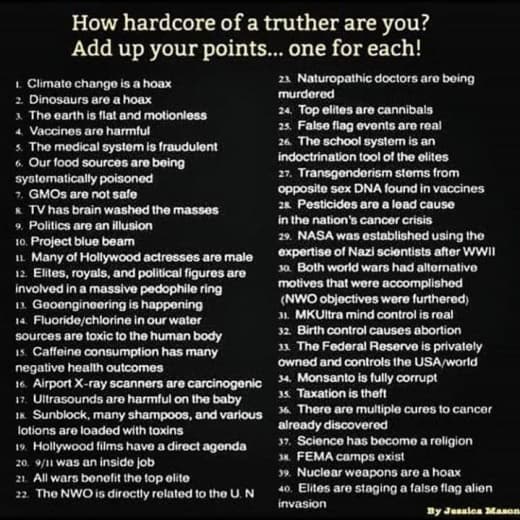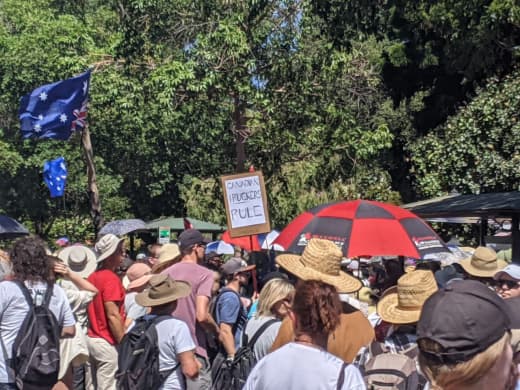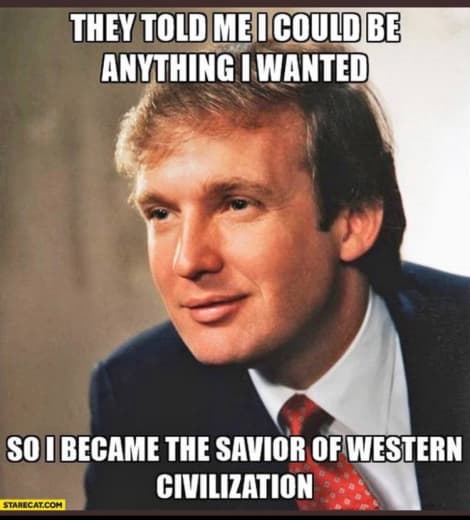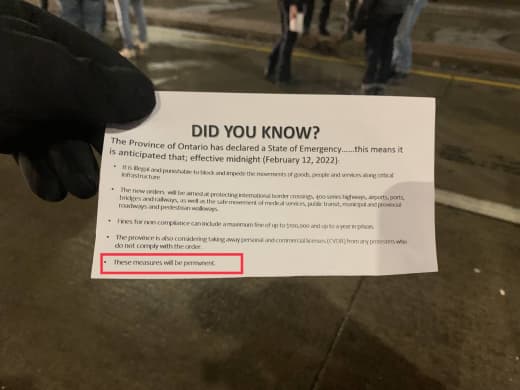Convoy to Ottawa 2022
Previous messages
Next messages
11 February 2022
WW
19:30
Word Warrior
In reply to this message
I dont think anyone has seen any cash but I'm not sure I give up... when did 1.4 million get put in a td bank is my question
P
19:30
PatriotMountainMan
In reply to this message
STOP ENGAGING IN MEDICAL FRAUD, which is a felony!
NS
19:31
Never Say NeverFX
In reply to this message
You have no idea of the depth to their criminalism...
N
SV
B
DK
19:31
Den Kr
In reply to this message
They have to pretend they are doing their job when ctv and big boss is watching. At night they are friends with the truckers at this point
C1
S
FF
19:32
Freedom Fighter
In reply to this message
For e transfers and the original go fund me time for a new fucking accountant we are not rich that is a lot of fucking money to loose to Fat Trudeau
O
19:32
Oleg
I think tomorrow is going to be a historical day for Canada.
We are at the moment of direct confrontation of Canadian government and people of Canada. The government of a free country Canada decided to ban protests and if you go and protest you will get a criminal record, a fine up to $100000 or 1 year in prison. That is the most desperate thing I've seen being done by government in my entire life. This is literally their last move, they've tried everything else.
They are trying to scare people one last time, but it isn't going to work. People are not afraid anymore. Amount of awakened people have surpassed critical mass and it's increasing exponentially. Tomorrow there will be even more Canadians comparing to the previous weekend.
We've already won, our government just doesn't understand it yet.
However no one knows what exactly is going to happen tomorrow. I hope it won't, but it might get ugly. So I am asking all of you who've been in this community to pray for us Canadians tomorrow. We need this more than ever.
Thank you. With love from Canada.
We are at the moment of direct confrontation of Canadian government and people of Canada. The government of a free country Canada decided to ban protests and if you go and protest you will get a criminal record, a fine up to $100000 or 1 year in prison. That is the most desperate thing I've seen being done by government in my entire life. This is literally their last move, they've tried everything else.
They are trying to scare people one last time, but it isn't going to work. People are not afraid anymore. Amount of awakened people have surpassed critical mass and it's increasing exponentially. Tomorrow there will be even more Canadians comparing to the previous weekend.
We've already won, our government just doesn't understand it yet.
However no one knows what exactly is going to happen tomorrow. I hope it won't, but it might get ugly. So I am asking all of you who've been in this community to pray for us Canadians tomorrow. We need this more than ever.
Thank you. With love from Canada.
G
K
B
19:33
Boondock Saint
boycott amazon, spodify, facebook, and every other monopoly.
WW
19:33
Word Warrior
In reply to this message
Oh yeah they were sending etransfers too as well as go fund me and give send go and bitcoin
C1
FF
НС
LO
B
19:34
Boondock Saint
they want to make us think they're not doing what they said with the money , so they can create dissent within the ranks of the truckers
KL
19:34
Kim L
In reply to this message
Well it was from another group..but wouldnt you just wanna be safe with kids..just a heads up....to give you a warning to be safe....i share what i believe people will see it as helping them. So stop with the prove this or prove that....use it as a tool.wouldnt you want a warning if something bad was to come? Wake up
JB
TT
G
D
K
AC
19:37
Anthony Chan 🍊🍊
In reply to this message
It’s not a medical fraud. It’s called defense against medical tyranny.
K
19:37
KRP
In reply to this message
Nah I don’t like fake news without a source. They’ve make many many empty threats so this one has 0% chance. It would be a huge publicized mess that wouldn’t go over well and wouldn’t end well in court for them either.
J
19:37
Janice
In reply to this message
Wow yes this is our moment in the battle for earth...God is with us....
ZK
PA
FH
SZ
C1
PA
19:39
Patricia A
In reply to this message
Here may be the truth/reason…Why Trudeau won’t back down.
https://rumble.com/vupkuv-breaking-criminal-canadian-monopoly-dr.-david-martin-exposes-why-trudeau-wo.html
https://rumble.com/vupkuv-breaking-criminal-canadian-monopoly-dr.-david-martin-exposes-why-trudeau-wo.html
FM
19:39
Francisco Martinez
Notice everyone !!! As we are in the third year of the most intense psychological operation ever pursued against Humanity
I find myself and my family equipped and ready for this freedom for we got the vaccine documents without taking the poison and you'll are advised to do same, inbox me for more information STAY SAFE👍
I find myself and my family equipped and ready for this freedom for we got the vaccine documents without taking the poison and you'll are advised to do same, inbox me for more information STAY SAFE👍
Y
LS
19:39
Lana Sara
M
19:41
Mr. Roberts
In reply to this message
Did you read what was just outlined in detail?
The graphenated are hooked to 5G via proven conclusively micro routers and other nano tech.
So no. When they hit the 5G switch either regionally or everywhere at once and the "vaxxed" (graphenated) start dropping the "variant" will be blamed on the "unvaxxed" and they will be hunted down by both the State and their neighbors.
This is the plan.
It is a race. Truth re:
what's in the shots being understood by a tipping point...
Vs.
Cass Sunstein's et al. faux narrative of spikes, hiv, parasites, gain of function,
zombie prions etc. carrying the day.
So it is extremely important to be absolutely clear what is butchering and maiming the children and everyone else and not fall for the massive fear porn faux narrative concocted by the WHO's Minister of Propaganda.
The graphenated are hooked to 5G via proven conclusively micro routers and other nano tech.
So no. When they hit the 5G switch either regionally or everywhere at once and the "vaxxed" (graphenated) start dropping the "variant" will be blamed on the "unvaxxed" and they will be hunted down by both the State and their neighbors.
This is the plan.
It is a race. Truth re:
what's in the shots being understood by a tipping point...
Vs.
Cass Sunstein's et al. faux narrative of spikes, hiv, parasites, gain of function,
zombie prions etc. carrying the day.
So it is extremely important to be absolutely clear what is butchering and maiming the children and everyone else and not fall for the massive fear porn faux narrative concocted by the WHO's Minister of Propaganda.
RH
19:41
Rob Hay
A Climate Change Experiment
with Justin Trudeau
First, we need an Apparatus. This will consist of an enclosed room with a chair containing straps for the legs and feet. Next a video feed with clear sound recording so all noises can be recorded.
Line up the Sacred Cows which will produce farts are picked up and pumped into the room with normal air.
The objective is to determine if there is any climate change in the room. We only have one expert in our Country that can make such a decision on this as he seems to hold all the decision-making power, that being Trudeau, so we insert him into our apparatus. We don’t want him hurting himself, so we strap him into the chair.
Now over several hours, maybe days we observe how farts from cows affect the climate changes in the room asking Trudeau our decision maker if he has noticed any climate change.
We could also try other animal farts as well and human farts for carp Atari e measure.
It only seems fair that the decision maker be directly connected to the science he purports to stand on.
Then he can write a white paper of his ongoing observations once he comes to his decision, for peer review and acceptance. I sure other decision makers will want to verify the results of this experiment as per the Peer Review paper.
The expected outcome we are looking for in this experiment is no evidence produced in the room of climate change. As mentioned before a number of hours and perhaps days may be required to determine if climate change can be observed in any way. If climate Change does occur numerous repeat experiments will be required to verify this.
with Justin Trudeau
First, we need an Apparatus. This will consist of an enclosed room with a chair containing straps for the legs and feet. Next a video feed with clear sound recording so all noises can be recorded.
Line up the Sacred Cows which will produce farts are picked up and pumped into the room with normal air.
The objective is to determine if there is any climate change in the room. We only have one expert in our Country that can make such a decision on this as he seems to hold all the decision-making power, that being Trudeau, so we insert him into our apparatus. We don’t want him hurting himself, so we strap him into the chair.
Now over several hours, maybe days we observe how farts from cows affect the climate changes in the room asking Trudeau our decision maker if he has noticed any climate change.
We could also try other animal farts as well and human farts for carp Atari e measure.
It only seems fair that the decision maker be directly connected to the science he purports to stand on.
Then he can write a white paper of his ongoing observations once he comes to his decision, for peer review and acceptance. I sure other decision makers will want to verify the results of this experiment as per the Peer Review paper.
The expected outcome we are looking for in this experiment is no evidence produced in the room of climate change. As mentioned before a number of hours and perhaps days may be required to determine if climate change can be observed in any way. If climate Change does occur numerous repeat experiments will be required to verify this.
LO
19:41
Linda OIKNINE
In reply to this message
They will send all the illegals that Biden allowed through the borders to fight the nations. They are disgusting evils. No balls. They use others to do their dirty work .
If they were men, they would come in person but they hide like scary cats in their bunkers.
You make all these rules and forceful demands, come do them in person, face to face. NO, they are chickens, always have been but God Almighty will meet them face to face and they will tremble like leaves blown by high winds.
If they were men, they would come in person but they hide like scary cats in their bunkers.
You make all these rules and forceful demands, come do them in person, face to face. NO, they are chickens, always have been but God Almighty will meet them face to face and they will tremble like leaves blown by high winds.
C1
L
MR
19:43
MAX REZIN
Weird how almighty TRUMP says in all his interviews that Operation Warpseed is great, and his advocated injections are not only safe and effective but that NO ONE has died from them......Has he not seen the VAERS report?? Which a recent Harvard University report found that VAERS is only 1% reported and recorded out of all actual cases.....???
Weird how he also signed the EUA on 9/19/19 to greenlight all mRNA experimental gene therapy treatments (before the plandemic rollout), which previously were never deemed to be safe by the corrupt FDA because those products never made it past phase 1 in the clinical animal trials, because the animals always died early on.
Strange too how Trump's FDA commissioner Scott Gottlieb joined the board at Pfizer approximately 2 months after departing the FDA? Also strange how his intial FDA commissioner is now a board member of Moderna? (Gates/Soros)
Bizzare how Trump never fired Fauci, and never released Julian Assange from prison who helped to get him elected. However instead he pardoned people like zionist Aviem Sella (Jonathan Pollard's handler = zionist spy), zionist Sholom Rubashkin, and zionist Charles Kushner, his son-in law Jared's father.
In the USA, VAERS currently has recorded 24,000 Deaths and 128,000 Injuries, many which are life threatening as you can easily see the countless testimonials here on Telegram. Now multiply those numbers by a factor of 99. (can you do the math???)
So my question then is who is lying? The vaxxed dead and injured? VAERS?
Or Trump???
Weird how he also signed the EUA on 9/19/19 to greenlight all mRNA experimental gene therapy treatments (before the plandemic rollout), which previously were never deemed to be safe by the corrupt FDA because those products never made it past phase 1 in the clinical animal trials, because the animals always died early on.
Strange too how Trump's FDA commissioner Scott Gottlieb joined the board at Pfizer approximately 2 months after departing the FDA? Also strange how his intial FDA commissioner is now a board member of Moderna? (Gates/Soros)
Bizzare how Trump never fired Fauci, and never released Julian Assange from prison who helped to get him elected. However instead he pardoned people like zionist Aviem Sella (Jonathan Pollard's handler = zionist spy), zionist Sholom Rubashkin, and zionist Charles Kushner, his son-in law Jared's father.
In the USA, VAERS currently has recorded 24,000 Deaths and 128,000 Injuries, many which are life threatening as you can easily see the countless testimonials here on Telegram. Now multiply those numbers by a factor of 99. (can you do the math???)
So my question then is who is lying? The vaxxed dead and injured? VAERS?
Or Trump???
CT
19:43
Captain Tennille
C
CriticalMassAwakening 11.02.2022 19:43:13
Klaus Anal Schwab 🤣🤣🤣https://youtu.be/ONxrt8keZ3U
LS
19:44
Lana Sara
https://www.instagram.com/tv/CZ3GCDyJ6wc/?utm_medium=copy_link
Press conference !!!!
Press conference !!!!
A
19:44
Audrey
In reply to this message
We've lost everything, what is there left to lose? They're not very bright.
M
Y
19:44
Yossef
In reply to this message
Those who follow orders without question! Just pathetic! Cowards!
kW
19:45
ken Worthinston
In reply to this message
they are gonna go up against 50,000 53,000kg trucks…. trust me they aren’t sleeping
BH
19:45
Britt H
3
3D to 5D Consciousness 08.02.2022 08:07:34
https://twitter.com/ChickenGate/status/1490471077214105606?s=20&t=oG6ln9T_5bFq1TaVVT8pFQ
When you donate to self proclaimed “Queen” Romano” it is going to Liberal Party of Canada.
This is another scam to fund the Liberal Party.
I can’t believe people follow this dingbat.
Please make this viral so people do not get scammed.
https://t.me/News_3Dto5D
When you donate to self proclaimed “Queen” Romano” it is going to Liberal Party of Canada.
This is another scam to fund the Liberal Party.
I can’t believe people follow this dingbat.
Please make this viral so people do not get scammed.
https://t.me/News_3Dto5D
TT
D
19:46
DebbieSN
Very interesting shared by not.tv today! Wanted to share with you in case nobody saw this! Dr David Martin!
https://www.facebook.com/102136931917801/videos/351964073249496/
https://www.facebook.com/102136931917801/videos/351964073249496/
C1
NS
19:48
Never Say NeverFX
Hilarious, great video made for the TRUCKERS! MUST WATCH! https://www.bitchute.com/video/Vf9J3f2Y7MGX/
LF
S
19:50
Swade
Why not a strategy of retreat and reassemble in different places for truckers? Slow roll an agreed upon route. No need for last stands of any kind imo.
PA
19:50
Pepe Agenter
Dildololo is ripping us off almost as much as Mulroney.
S
19:51
Sherry
Breaking: Criminal Canadian Monopoly Dr. David Martin Exposes Why Trudeau Won't Back Down
https://www.redvoicemedia.com/2022/02/breaking-criminal-canadian-monopoly-dr-david-martin-exposes-why-trudeau-wont-back-down/
https://www.redvoicemedia.com/2022/02/breaking-criminal-canadian-monopoly-dr-david-martin-exposes-why-trudeau-wont-back-down/
PA
D
RH
19:53
Rob Hay
I was thinking if people poured motor oil on the roads that are being blocked, it would make it impossible for other vehicles to come into the area.
TB
19:53
Terry Bishop
Liberals sure didn’t have a issue shutting things down
But others do it to protest government you can’t
They can screw you
But you can’t screw them
But others do it to protest government you can’t
They can screw you
But you can’t screw them
WS
19:54
Warren S
In reply to this message
All he has to do is accelerate his timetable if he wants the truckers to leave sooner. People have been duped by government too many times to fall for this rouse.
SW
TH
GR
19:55
Gary Reney
In reply to this message
🐑🐑🐑 get the fuck out of here brainwashed thug. If vaccines worked and reduce severity then there would not be more deaths in 2021 with vaccines around that covid deaths in 2020 when there were no vaccines. On the top of that in 2020 they labeled all fucking deaths as covid.
DJ
Mike pinned this message
GR
19:56
Gary Reney
How does these moles and trudeau liberals has infiltrated here?
LJ
PF
19:57
Patriot Farmer Girl
In reply to this message
People are dying all over from effects of the mRNA jab. They are not dying from covid.
19:58
In reply to this message
It’s very suspicious when people are being FORCED to,get the jab in order to make a living. Giant red flag. It’s not about health. It never was. It’s about control.
DB
19:59
Danny Bee
D
David Avocado Wolfe 09.02.2022 09:53:59
Remember these globalists are career liars and fraudsters. Be ever vigilant and watch for their dirty tricks. (3 min 52 seconds) Their goal has always been the same: to kill or enslave you and take your money and property.
DB
20:00
Danny Bee
In reply to this message
Yep, and after you are jabbed 3 times you are still in masks andlocked down
TH
M
Mike pinned this message
GR
20:02
Gary Reney
Any dumbass sheep 🐑 that gives example of polio dont understand the basic difference between ever mutating respiratory viruses of flu/corona family and enteroviruses like polio.
vaccines for enteroviruses are understandable because doesn't need hosts dna to bind or mutate.. There was never a vaccine that was approved and required in school for respiratory viruses.
Its a fact and 99.99 % journalists and these brainwashed sheep either do not know the fact / science or conveniently ignores it.
vaccines for enteroviruses are understandable because doesn't need hosts dna to bind or mutate.. There was never a vaccine that was approved and required in school for respiratory viruses.
Its a fact and 99.99 % journalists and these brainwashed sheep either do not know the fact / science or conveniently ignores it.
NS
20:02
Never Say NeverFX
This is from a Bitchute commenter: "djWillyDong
MSG TO THE PEOPLE:
Listen to me science is my field.
There is no scientific proof for the existence of this new sickness. Tell the government that they must produce this evidence or drop the covid crap RIGHT NOW.
People talking on TV is not proof of anything.
In addition, they will try to show you some fake pictures and make up some graphs. This is proof of nothing. Tell them to take a sample from a "positive case" and put it under a microscope. Tell them to show you the live virus and to do this all at the same time.
This would be proof but they won't do it because there is NO live virus to show us.
This is how we win, the truth will set us free."
MSG TO THE PEOPLE:
Listen to me science is my field.
There is no scientific proof for the existence of this new sickness. Tell the government that they must produce this evidence or drop the covid crap RIGHT NOW.
People talking on TV is not proof of anything.
In addition, they will try to show you some fake pictures and make up some graphs. This is proof of nothing. Tell them to take a sample from a "positive case" and put it under a microscope. Tell them to show you the live virus and to do this all at the same time.
This would be proof but they won't do it because there is NO live virus to show us.
This is how we win, the truth will set us free."
TF
CT
Mike pinned this message
MP
BH
Mike pinned this message
J
B
LL
20:08
Lisa Lboo
TRADES ARE JOINING IN, here is their itinerary if those that want to join in.
https://www.facebook.com/groups/516123123140200/permalink/516269299792249/
https://www.facebook.com/groups/516123123140200/permalink/516269299792249/
GR
20:08
Gary Reney
In reply to this message
That is correct these latest vaccines for polio are leaky and cause polio than getting rid of it. Also there are cases documented in india that polio vaccine may end polio but caused paralysis. What is a point of vaccine that causes serious illness like that?
MR
20:09
MAX REZIN
Weird how almighty TRUMP says in all his interviews that Operation Warpseed is great, and his advocated injections are not only safe and effective but that NO ONE has died from them......Has he not seen the VAERS report?? Which a recent Harvard University report found that VAERS is only 1% reported and recorded out of all actual cases.....???
Weird how he also signed the EUA on 9/19/19 to greenlight all mRNA experimental gene therapy treatments (before the plandemic rollout), which previously were never deemed to be safe by the corrupt FDA because those products never made it past phase 1 in the clinical animal trials, because the animals always died early on.
Strange too how Trump's FDA commissioner Scott Gottlieb joined the board at Pfizer approximately 2 months after departing the FDA? Also strange how his intial FDA commissioner is now a board member of Moderna? (Gates/Soros)
Bizzare how Trump never fired Fauci, and never released Julian Assange from prison who helped to get him elected. However instead he pardoned people like zionist Aviem Sella (Jonathan Pollard's handler = zionist spy), zionist Sholom Rubashkin, and zionist Charles Kushner, his son-in law Jared's father.
In the USA, VAERS currently has recorded 24,000 Deaths and 128,000 Injuries, many which are life threatening as you can easily see the countless testimonials here on Telegram. Now multiply those numbers by a factor of 99. (can you do the math???)
So my question then is who is lying? The vaxxed dead and injured? VAERS?
Or Trump???
Weird how he also signed the EUA on 9/19/19 to greenlight all mRNA experimental gene therapy treatments (before the plandemic rollout), which previously were never deemed to be safe by the corrupt FDA because those products never made it past phase 1 in the clinical animal trials, because the animals always died early on.
Strange too how Trump's FDA commissioner Scott Gottlieb joined the board at Pfizer approximately 2 months after departing the FDA? Also strange how his intial FDA commissioner is now a board member of Moderna? (Gates/Soros)
Bizzare how Trump never fired Fauci, and never released Julian Assange from prison who helped to get him elected. However instead he pardoned people like zionist Aviem Sella (Jonathan Pollard's handler = zionist spy), zionist Sholom Rubashkin, and zionist Charles Kushner, his son-in law Jared's father.
In the USA, VAERS currently has recorded 24,000 Deaths and 128,000 Injuries, many which are life threatening as you can easily see the countless testimonials here on Telegram. Now multiply those numbers by a factor of 99. (can you do the math???)
So my question then is who is lying? The vaxxed dead and injured? VAERS?
Or Trump???
EW
B
20:09
Bernie
Please check out above link 11:07
Unbelievable
Unbelievable
E
KL
20:10
Kim L
A
A 11.02.2022 16:45:29
🍁List of Channels that frequently live stream, peaceful demonstrations:🍁
** 🇨🇦🍁 -=Ottawa Streams=-: 🍁🇨🇦
MACHINES EVERYWHERE
https://www.youtube.com/c/MACHINESEVERYWHEREVIDEO/videos
Ottawalks
https://www.youtube.com/c/Ottawalks/videos
VIDSTORM
https://www.youtube.com/channel/UCL_sTa-1aWSdkPbxWEELusQ
Tireroaster's Garage
https://www.youtube.com/channel/UCSFKqYxrBNSpvx59zphI6QA/videos
Marcel Irnie
https://www.youtube.com/c/MarcelIrnieIrnieracing/videos
Travel Fun 69
https://www.youtube.com/c/TravelFun69/videos
Bowlleux Mobile
https://www.youtube.com/c/BowlleuxMobile/videos
UOttawaScotty
https://www.youtube.com/c/UOttawaScotty/videos
adamnucci
https://www.youtube.com/channel/UCcFfXj5KPthEelsoJMn-PgQ/videos
Zoke
https://www.youtube.com/c/ZokeOfficiall/videos
ZOT
https://www.youtube.com/c/ZOTyoutube/videos
🇨🇦🍁 -=Multi Stream=-: 🍁🇨🇦
The 4K Guy - Fire & Police
https://www.youtube.com/user/pascalmarch/videos
Portland Andy
https://www.youtube.com/channel/UCPHWVzGcW-iozudjp8U984g
MiTreasureHunter
https://www.youtube.com/c/MiTreasureHunter/videos
RedPilling The Masses
https://www.youtube.com/channel/UCkOSFTTJQfQCk_wR33GM8vA/videos
Viva Frei
https://www.youtube.com/c/VivaFrei/videos
🇨🇦🍁 -=Toronto Streams=-: 🍁🇨🇦
The Transporter
https://www.youtube.com/c/TheTransporterbusiness/videos
Kevin Kaye
https://www.youtube.com/c/KevinKaye/videos
🇨🇦🍁 -=Windsor Streams=-: 🍁🇨🇦
Aron
https://www.youtube.com/channel/UCFTGJCqhq01hPo13s7-yNVA
**Share!
Let me know if there are other channel I should add to the list!
** 🇨🇦🍁 -=Ottawa Streams=-: 🍁🇨🇦
MACHINES EVERYWHERE
https://www.youtube.com/c/MACHINESEVERYWHEREVIDEO/videos
Ottawalks
https://www.youtube.com/c/Ottawalks/videos
VIDSTORM
https://www.youtube.com/channel/UCL_sTa-1aWSdkPbxWEELusQ
Tireroaster's Garage
https://www.youtube.com/channel/UCSFKqYxrBNSpvx59zphI6QA/videos
Marcel Irnie
https://www.youtube.com/c/MarcelIrnieIrnieracing/videos
Travel Fun 69
https://www.youtube.com/c/TravelFun69/videos
Bowlleux Mobile
https://www.youtube.com/c/BowlleuxMobile/videos
UOttawaScotty
https://www.youtube.com/c/UOttawaScotty/videos
adamnucci
https://www.youtube.com/channel/UCcFfXj5KPthEelsoJMn-PgQ/videos
Zoke
https://www.youtube.com/c/ZokeOfficiall/videos
ZOT
https://www.youtube.com/c/ZOTyoutube/videos
🇨🇦🍁 -=Multi Stream=-: 🍁🇨🇦
The 4K Guy - Fire & Police
https://www.youtube.com/user/pascalmarch/videos
Portland Andy
https://www.youtube.com/channel/UCPHWVzGcW-iozudjp8U984g
MiTreasureHunter
https://www.youtube.com/c/MiTreasureHunter/videos
RedPilling The Masses
https://www.youtube.com/channel/UCkOSFTTJQfQCk_wR33GM8vA/videos
Viva Frei
https://www.youtube.com/c/VivaFrei/videos
🇨🇦🍁 -=Toronto Streams=-: 🍁🇨🇦
The Transporter
https://www.youtube.com/c/TheTransporterbusiness/videos
Kevin Kaye
https://www.youtube.com/c/KevinKaye/videos
🇨🇦🍁 -=Windsor Streams=-: 🍁🇨🇦
Aron
https://www.youtube.com/channel/UCFTGJCqhq01hPo13s7-yNVA
**Share!
Let me know if there are other channel I should add to the list!
GI
20:10
Grumpy Italian
In reply to this message
Supporting the truckers and freedomconvoy should not equate to supporting Trump. I will never support Trump but stand by the truckers. If anything, supporting Trump will only give us less credibility. Will hurt our cause.
MM
JM
GA
Y
20:14
Yossef
In reply to this message
Not one cop crosses the line, not one!
Let me tell you how I see it, an officer’s oath upon seeking the badge is to the protection of the people to whom power rests, the citizen. Whereupon those who govern are in the most fragile of liabilities as they bear the greatest of responsibilities - the dispensation of Justice under God, to which they will be questioned in the next life.
Freedom is the responsibility and exercise of personal sovereignty to oneself and the recognition not to breach another’s.
Let me tell you how I see it, an officer’s oath upon seeking the badge is to the protection of the people to whom power rests, the citizen. Whereupon those who govern are in the most fragile of liabilities as they bear the greatest of responsibilities - the dispensation of Justice under God, to which they will be questioned in the next life.
Freedom is the responsibility and exercise of personal sovereignty to oneself and the recognition not to breach another’s.
AH
C
R
SV
20:17
S V
C
COVID 1984, Science & Data 11.02.2022 18:15:49
"Armed forces vets assembled in front of Canada’s Parliament at 11am this morning to express support for the truckers #FreedomConvoy" [Big Pic News, Twitter]
SF
FB
20:18
Free Bird
Convoy freedom, march to DC!
S
20:18
Smoking Man
?
🇮🇹🇨🇦 RealTruthReport 10.02.2022 04:39:07
🇨🇦🚗🚛🚗🚛🚗🚛🇨🇦Looks like everyone's wish has been answered, there's another convoy! Instead of going to downtown Vancouver it looks like it's headed to the 176 Pacific border crossing! Tell everyone you know!! SATURDAY FEBRUARY 12th 10AM. Should be 10000s of people.
Y
D
20:20
Dino
In reply to this message
They’ve proven that the vaccinated have more viral load than unvaxed. It’s also been proven that the majority of vaxed is the majority of population getting omicron. They also now are saying if you got a third jab you need to get a text for AIDS. The jabs are constantly attacking the immune system
S
20:20
Sherry
FB
20:21
Free Bird
Freedom Convoy to DC and continue to Ottawa!
p
DR
20:24
Dale Rothgordt
H
TG
20:24
Tom Glover
Who has a live link for the ambassador bridge right now ???
JC
20:24
Justin Castro
In reply to this message
As opposed to when he capitulated to the Hunter Biden non-laptop scandal, or didn’t say a word when AZ called it for Biden when the votes weren’t even in yet. Yeah he’s totally on our side 👍🏼
B
20:24
BM
Retired OPP Officer Asks police to stand down
https://youtube.com/watch?v=H0l_Gn7IZw4&feature=share
https://youtube.com/watch?v=H0l_Gn7IZw4&feature=share
PA
20:24
Patricia A
Friday Feb 11-Dr. David Martin and the cdn govt.
He requests to be shared widely. https://www.facebook.com/102136931917801/videos/351964073249496/
He requests to be shared widely. https://www.facebook.com/102136931917801/videos/351964073249496/
ZK
SF
20:25
Shannon Franco
Can I ask, what happened to the Patriot groups?
E
20:26
Edward
Reject the one world government, digital government currency, digital id/passport, and all other measures meant to strip you of your freedoms and possibly your soul. They try to propose this type of stuff by making it seem for the greater good, or convenience, etc. It is a ruse. Beware sugar coated divide and conquer crap. Never consent and never comply.
S
20:27
Sharon
In reply to this message
I call bull💩! 3 doses and dramatically loses efficacy in 4-8 weeks
SR
EW
20:27
Eagle Wolf
“Sharing from another post”……….DEEP DIVE (share): Not many people really understand what’s going on with the protest. There are many reasons people are fighting. No mask, no forced vaccines, no passports etc… basically a fight to lift all mandates. So what going on with Trudeau? Why will he not negotiate. Well the truth is he can’t. A house of cards will fall. All of the information below is available for you to research. Stop complaining about the protesters fighting for freedom thinking it’s just about a mask or a jab. This is the real reason, and nope most truckers are not aware. But it’s time to start waking up the rest of Canada. This is not about a party issue. I don’t care if you are liberal, conservative or independent. This fight is the biggest fight of our lives. The WEF has invested millions of dollars in their puppet and if he fails, they go back to square zero.
"It is not Trudeau's choice to step down or to attempt to stay. It is the decision of the World Economic Forum (WEF.) This is a critical decision which will affect the entire world. This is not a battle for just Canada, it is a battle for the World. This is the first domino of corruption and if it falls, the entire plan of the WEF fails because all the corrupt dominos will fall if they are forced out of power. Leaving them in power really is simply a short respite for the People.
Frankly, the WEF cannot afford for Trudeau to step down. If he falls, Biden falls, Australia falls, New Zealand falls and all of Europe falls. Then the rest of the world joins in. They are all watching. Who do you thing is going to fund the counter movement from the police.
The sane world is crazy not to make Ottawa the hill they will die on and not give in. It is an opportunity unexpected. Probably an opportunity that will not come again.
The Truckers are truly the People's Army. Where else could you quickly assemble such a strong, younger Army to possibly confront the Globalist Tyranny Army? It is an Army everyone else can join and get behind. Half the Globalist Tyranny Army will desert them and join the Truckers if they appear to succeed in Ottawa.
Truckers can win, this but it will take support from everyone. There is a window of opportunity that will not stay open forever. Time is not on our side. A plea of help went out last night calling everyone to be ready.
But no, the WEF is not going to go without a fight or without having great fear that they will be smashed by this world-wide movement. Even then the WEF members will be sorely afraid of ending up like Mussolini hanging in the Milan Square and will fight to avoid that.
I think people greatly underestimate the overall importance of Ottawa and underestimate the difficulty of overcoming Trudeau. He and the WEF simply cannot afford to lose. I fear also that the People of the world cannot afford to lose in Ottawa. It will likely be the People's last battle if they lose Ottawa.
I do not agree that this is only about a non violent confrontation. I don't think the WEF will fold because of a lengthy non violent protest of a few thousand truckers. They have been working on this tyranny plan for 100 years. I think they will fold only if they are clearly weaker strength than the People's Army. Whether it is non violent or violent confrontation, for either to succeed requires great power standing behind the Truckers with obvious reserve waiting behind them. This means the WEF must act now before the People's Army grows too large with strong reserves. I expect action by the WEF soon to squash this uprising. This is not about Trudeau, this is the WEF plan in place around the world. Everyone must be ready to heavily support the Truckers and step into the battle if they are attacked."
Look at comments… I also just leaned that Jim Watson is part of this WEF. No wonder he is siding with tyranny.
"It is not Trudeau's choice to step down or to attempt to stay. It is the decision of the World Economic Forum (WEF.) This is a critical decision which will affect the entire world. This is not a battle for just Canada, it is a battle for the World. This is the first domino of corruption and if it falls, the entire plan of the WEF fails because all the corrupt dominos will fall if they are forced out of power. Leaving them in power really is simply a short respite for the People.
Frankly, the WEF cannot afford for Trudeau to step down. If he falls, Biden falls, Australia falls, New Zealand falls and all of Europe falls. Then the rest of the world joins in. They are all watching. Who do you thing is going to fund the counter movement from the police.
The sane world is crazy not to make Ottawa the hill they will die on and not give in. It is an opportunity unexpected. Probably an opportunity that will not come again.
The Truckers are truly the People's Army. Where else could you quickly assemble such a strong, younger Army to possibly confront the Globalist Tyranny Army? It is an Army everyone else can join and get behind. Half the Globalist Tyranny Army will desert them and join the Truckers if they appear to succeed in Ottawa.
Truckers can win, this but it will take support from everyone. There is a window of opportunity that will not stay open forever. Time is not on our side. A plea of help went out last night calling everyone to be ready.
But no, the WEF is not going to go without a fight or without having great fear that they will be smashed by this world-wide movement. Even then the WEF members will be sorely afraid of ending up like Mussolini hanging in the Milan Square and will fight to avoid that.
I think people greatly underestimate the overall importance of Ottawa and underestimate the difficulty of overcoming Trudeau. He and the WEF simply cannot afford to lose. I fear also that the People of the world cannot afford to lose in Ottawa. It will likely be the People's last battle if they lose Ottawa.
I do not agree that this is only about a non violent confrontation. I don't think the WEF will fold because of a lengthy non violent protest of a few thousand truckers. They have been working on this tyranny plan for 100 years. I think they will fold only if they are clearly weaker strength than the People's Army. Whether it is non violent or violent confrontation, for either to succeed requires great power standing behind the Truckers with obvious reserve waiting behind them. This means the WEF must act now before the People's Army grows too large with strong reserves. I expect action by the WEF soon to squash this uprising. This is not about Trudeau, this is the WEF plan in place around the world. Everyone must be ready to heavily support the Truckers and step into the battle if they are attacked."
Look at comments… I also just leaned that Jim Watson is part of this WEF. No wonder he is siding with tyranny.
C
20:28
Cymon T
A
AbsoluteConviction1776 🦅🇺🇸🗽 11.02.2022 20:12:57
An accurate representation of the Freedom Trucks vs Covid Restrictions.
HONK HONK!!
HONK HONK!!
8
S
20:29
Sharon
òjr
WO
Y
KL
20:31
Kim L
D
David Avocado Wolfe 11.02.2022 12:35:43
February 11, 2022: ✨🥑✨I’m working my way North to support our Truckers. Stopped in at a friend’s place to deliver this video message. This is the Fight We Were Born For!! Please Share!
https://t.me/DavidAvocadoWolfe
https://t.me/DavidAvocadoWolfe
LC
20:31
L C
Copied from Maskless Shopping in Comox Valley chat….The opposition parliament has put forward a motion to abolish mandates! It is in the schedule at commons at 3pm on Monday. There will be a vote. We urgently need to write to our MP an email (phone on Saturday as well!) so that they vote for the cancellation. You can find who your MP is here by postal code:
https://www.ourcommons.ca/members/en
Sample letter what to write to MP
<name>,
I am a resident of <town, province>. It has come to my attention that a motion has been put forward in the house of commons to end COVID-19 mandates and restrictions, which will be voted on by Members of Parliament. As your constituent, I’m asking that you vote for ending all mandates and vaccination passports immediately. It is time to follow medical science instead of political science and do the right thing for the people.
Sincerely,
Name
Address
Ask all members if your family, friends to write a separate letter. We are pressed with time. Otherwise they are planning to “send” everyone home brutally. The page with list of MPs has been taken down for the last few hours. I found another link that is working: https://openparliament.ca/politicians/ Send am email right away and phone tomorrow morning. Monday is too late!
https://www.ourcommons.ca/members/en
Sample letter what to write to MP
<name>,
I am a resident of <town, province>. It has come to my attention that a motion has been put forward in the house of commons to end COVID-19 mandates and restrictions, which will be voted on by Members of Parliament. As your constituent, I’m asking that you vote for ending all mandates and vaccination passports immediately. It is time to follow medical science instead of political science and do the right thing for the people.
Sincerely,
Name
Address
Ask all members if your family, friends to write a separate letter. We are pressed with time. Otherwise they are planning to “send” everyone home brutally. The page with list of MPs has been taken down for the last few hours. I found another link that is working: https://openparliament.ca/politicians/ Send am email right away and phone tomorrow morning. Monday is too late!
AR
20:31
Adam Rivas
P
Pepe Deluxe ⭐⭐⭐ 11.02.2022 15:47:09
But if the watchman see the sword come, and blow not the trumpet, and the people be not warned; if the sword come, and take any person from among them, he is taken away in his iniquity; but his blood will I require at the watchman's hand.
Ezekiel 33:6
Ezekiel 33:6
p
RK
S
G
20:33
George
F
Freedom For Canadians - No More Lies 11.02.2022 18:58:40
Ontario parametric quits and shares what he’s seen over the past few years..
🇨🇦 Join us 👉🏼 🇨🇦 https://t.me/+R4Fk1hggUJsI4Ie5
🇨🇦 Join us 👉🏼 🇨🇦 https://t.me/+R4Fk1hggUJsI4Ie5
ZH
S
WK
20:34
Will Knotkompli
Dear Lord, please watch over our truckers, freedom fighters and all those who support them. Keep them safe in the face of our enemies and give them strength to stay calm. Protect all those who fight for freedom and will hold the line. I believe we will win this. Amen.
LS
P
Y
KL
20:36
Kevin Loewen
LC
L C 11.02.2022 20:31:23
Copied from Maskless Shopping in Comox Valley chat….The opposition parliament has put forward a motion to abolish mandates! It is in the schedule at commons at 3pm on Monday. There will be a vote. We urgently need to write to our MP an email (phone on Saturday as well!) so that they vote for the cancellation. You can find who your MP is here by postal code:
https://www.ourcommons.ca/members/en
Sample letter what to write to MP
<name>,
I am a resident of <town, province>. It has come to my attention that a motion has been put forward in the house of commons to end COVID-19 mandates and restrictions, which will be voted on by Members of Parliament. As your constituent, I’m asking that you vote for ending all mandates and vaccination passports immediately. It is time to follow medical science instead of political science and do the right thing for the people.
Sincerely,
Name
Address
Ask all members if your family, friends to write a separate letter. We are pressed with time. Otherwise they are planning to “send” everyone home brutally. The page with list of MPs has been taken down for the last few hours. I found another link that is working: https://openparliament.ca/politicians/ Send am email right away and phone tomorrow morning. Monday is too late!
https://www.ourcommons.ca/members/en
Sample letter what to write to MP
<name>,
I am a resident of <town, province>. It has come to my attention that a motion has been put forward in the house of commons to end COVID-19 mandates and restrictions, which will be voted on by Members of Parliament. As your constituent, I’m asking that you vote for ending all mandates and vaccination passports immediately. It is time to follow medical science instead of political science and do the right thing for the people.
Sincerely,
Name
Address
Ask all members if your family, friends to write a separate letter. We are pressed with time. Otherwise they are planning to “send” everyone home brutally. The page with list of MPs has been taken down for the last few hours. I found another link that is working: https://openparliament.ca/politicians/ Send am email right away and phone tomorrow morning. Monday is too late!
KN
20:36
Kevin Naranjo
Windsor went black
A
20:36
A-DuB
In reply to this message
Apparently this is from Woodstock....I forwarded from what I thought was a trusted source...Sry about that....please ignore
S
B
20:38
Bee
T
VA
20:38
Vicki 🤍⚜️🤍 Anderson
R
KN
20:38
Kevin Naranjo
I cant find any live videos on any social media
J
20:38
Jake
Windsor is good so far
MF
T
20:39
Tracey
M
Martine Carlina 11.02.2022 16:40:48
Look at Windsor students walking out! Now if that isn't a little weekend inspiration I don't know what is!
This is the demographic that we have been missing through this entire ordeal. I'm so happy to see students coming together. If students across the country can follow in suit, we will be getting somewhere!
Bravo!! 💗💗💗
This is the demographic that we have been missing through this entire ordeal. I'm so happy to see students coming together. If students across the country can follow in suit, we will be getting somewhere!
Bravo!! 💗💗💗
S
KN
20:39
Kevin Naranjo
Supposedly they were going to stay live just in case
B
20:40
Bee
Does anyone have any links to lives
J
20:40
Jake
I know people there. The cops are being reasonable, being that they open 1 lane on each side for emergency vehicles. So they're doing alright. There's compromise on both sides, from the people and the police and the man in charge of the Police seems to be good Fellow 👍
KN
20:41
Kevin Naranjo
Anybody in Windsor here or know anything
S
KN
20:42
Kevin Naranjo
I know ottawa is good I have a few friends there sending me videos ✌️
S
PS
T
20:42
Tom
In reply to this message
A lot of folks on here have been tossed from fake book. So a fake book link is useless.
J
20:43
Jake
They passed an injunction in Windsor to make arrests, but I'm not sure if that is going to happen. They're saying the police are standing by and waiting for a lot of the people to leave for the night and then move in to make the arrests, but I'm not sure. It could just be intimidation
DK
20:43
David Koivu
In reply to this message
When JT sees this he might want to go blackface again and join the party
PS
20:43
Paul Stark
ALL to Ottawa this Weekend
DM
20:44
Dee Marie
If the company is part of the world economic forum then it's a company we need to stay away from. WEF it's not a coincidence that all the leaders that are a part of this group are also the ones going crazy with covid mandates
https://toronto.ctvnews.ca/td-bank-to-hand-convoy-funds-to-court-as-organizers-turn-to-cryptocurrency-1.5778435
https://toronto.ctvnews.ca/td-bank-to-hand-convoy-funds-to-court-as-organizers-turn-to-cryptocurrency-1.5778435
J
20:44
Jake
In reply to this message
I am in ottawa right now, and it seems to be going well. A lot of the police are in good spirits as well. Of course there are the few in the police crowd that are the opposite but all is good. Just have to stay alert and not drop our guard
H
S
20:45
Sovereign Authority
BD
20:45
Brooklin DeMelo
T
The OFFICIAL Freedom Canada Convoy 2022 11.02.2022 12:10:19
Chris Scott discussion on funds, etc... please listen.
KN
20:45
Kevin Naranjo
I was there 2 weekends can't make it this weekend but 100% be there next weekend ✊🏽✊🏽✊🏽
ML
20:46
Melissa Lopez
Tick tock has banned my IP address for supporting the Truckers. Good thing I have a backup IP address, they won't stop me from supporting a great cause and from posting the truth
KW
20:46
Kevin Williams
Awfully quiet tonight
N
20:46
Natasha
YOU ARE NOT ALONE
I AM IN LOVE WITH YOU!
YOU WILL BE THE SUNSHINE OF MY LIFE!
ВЫ НЕ ОДИНОКИ
Я ВАС БЕЗУМНО ЛЮБЛЮ!
ВЫ БУДЕТЕ ТЕМ САМЫМ СОЛНЕЧНЫМ СВЕТОМ МОЕЙ ЖИЗНИ!
❤️
I AM IN LOVE WITH YOU!
YOU WILL BE THE SUNSHINE OF MY LIFE!
ВЫ НЕ ОДИНОКИ
Я ВАС БЕЗУМНО ЛЮБЛЮ!
ВЫ БУДЕТЕ ТЕМ САМЫМ СОЛНЕЧНЫМ СВЕТОМ МОЕЙ ЖИЗНИ!
❤️
RK
..
20:47
. .
A
AGENDA 21⛔️Channel 11.02.2022 20:00:13
⚠️The CEO of moderna 💉shut down his Twitter account i think they know that vaccines 💉 done the job to immune system and ppl will start showing hiv aids positive and these bastards are escaping if anyone remember many CEO’s resigned at once same date few months back
LF
20:47
Lord Farqaad
In reply to this message
Switch to airplane mode, then switch back. Usually it gives you a new IP
SF
ML
DK
20:48
David Koivu
I know Doug Ford has lots of floor stickers, but has he also invested in zip-ties, might want to import containers of them, you can't arrest the entire population of a Free Canada
D
J
20:48
Jake
In reply to this message
That's right there were as far as I know, a couple undercover officers in the crowd. They're feeling like they will try and move in through the night, but like the officer mentioned, he doesn't have a problem with them because he feels everyone is being respectful, they are picking up garbage, cleaning up and being peaceful. So. That coming from the officer in charge is a really big relief to me.
RF
20:48
Robert Forsyth
I thought of some fun... is there anyone in Ottawa that could set up a big screen so we can go live with all day yoga classes on the fields of the Parliament? I can broadcast it live to up to 10 pages... lol
VV
20:49
Vera Verore
In reply to this message
This is not true. The unvaxxinated are tested more than unvaxxinated and they are so many false positives.
All my va$$ed friends that were together in an event all of them got sick at the same time 15 of them. And the spreader was a vaxcinated.
All my va$$ed friends that were together in an event all of them got sick at the same time 15 of them. And the spreader was a vaxcinated.
LF
JS
20:50
Jaskaran Singh
Ottawa
Rideshare Montreal to Ottawa 12feb 11am
Hi I’m going to Ottawa in my luxury Cadillac Escalade door to door service also available for more information or to book call 5147140041
And coming back Sunday 1pm
Rideshare Montreal to Ottawa 12feb 11am
Hi I’m going to Ottawa in my luxury Cadillac Escalade door to door service also available for more information or to book call 5147140041
And coming back Sunday 1pm
BD
20:50
Brooklin DeMelo
🥰
AR
20:50
Adam Rivas
C
Covid Red Pills 💊 11.02.2022 20:35:47
🇨🇦🚨 Canadians in Ottawa dancing the night away and chanting "F🍁ck Trudeau" ⚡🚛
RF
v
20:51
v v johnny
In reply to this message
Too bad many are still concerned about the trucker distractions and not concerned about the REASON. Not only is it to stop the mandates, it's to stop the WEF from implementing the new world order. The mandates implemented are to make us believe Klaus Schwab has our best interests at heart. Nothing could be further from the truth. Tru DOH! (WEF Puppet) won't stop lying to Canadians through MSM to keep them all from knowing the truth and the final result. (you will own nothing and be happy) The WEF must be stopped. Not the truckers.
aa
20:51
ant anty
my 2 cents , recently was outbreak in office, all got sick with covd, but me and my college that are uvaxxxed nothing
E
20:51
Elizabeth
In reply to this message
All you have to do is go look it up on Bradstreet & Dunns. Time to put the remote control away & do your OWN homework.
JD
20:52
Julia Do
TW
Tim Waggoner 11.02.2022 12:35:39
PLEASE READ! This is very encouraging!!!This is a personal message from a friend in the RCMP regarding the general feelings within the force and the guys with boots on the ground in Milk River and Coutts. I Asked if I could share with this group and he added a general message for all at the end. This is what he said:
I know some members who refused to go down there and I know one or two down there right now. I called them both and told them to leave and not do the Overtime and they can’t be compelled to do it. They said “oh these protesters are awesome they’re all so nice and I agree with the movement but I have no problem keeping the peace…” etc
Word is that members staying and working down there are all supporting the movement when they are all hanging out in their hotels after shift and stuff. People like me are pressuring the people we know down there.
[I asked if I could share this feedback]
Yes for sure. Tell them they have a lot of support from the ranks and people are starting to break. Lots of us have been to the big city rallies out of uniform supporting it. We are not allowed to Voice our support while in uniform etc because it’s using the force as a platform for our personal opinions. Many of us are angry as hell and felt compelled to get vaxxed not just because we wanted to keep our jobs but because we’re scared to be replaced by radical leftists.
The officers on the ground down there feel the demonstrators are respectful and polite and are on the right side. Keep up the peaceful conversations with the officers it’s working! Police are people too and it’s very hard for people to harm or use force on people they have built a relationship with and respect and love.
I know some members who refused to go down there and I know one or two down there right now. I called them both and told them to leave and not do the Overtime and they can’t be compelled to do it. They said “oh these protesters are awesome they’re all so nice and I agree with the movement but I have no problem keeping the peace…” etc
Word is that members staying and working down there are all supporting the movement when they are all hanging out in their hotels after shift and stuff. People like me are pressuring the people we know down there.
[I asked if I could share this feedback]
Yes for sure. Tell them they have a lot of support from the ranks and people are starting to break. Lots of us have been to the big city rallies out of uniform supporting it. We are not allowed to Voice our support while in uniform etc because it’s using the force as a platform for our personal opinions. Many of us are angry as hell and felt compelled to get vaxxed not just because we wanted to keep our jobs but because we’re scared to be replaced by radical leftists.
The officers on the ground down there feel the demonstrators are respectful and polite and are on the right side. Keep up the peaceful conversations with the officers it’s working! Police are people too and it’s very hard for people to harm or use force on people they have built a relationship with and respect and love.
VV
DJ
20:53
Dan Jankiv
In reply to this message
Whoever is saying this is bought off. The doctors that aren’t bought have a totally different view. Our doctors have invited those doctors to MANY (9) meetings to discuss and they have never even replied. The other doctors, not ours are paid off and lying to you. If they had proof they’d present it. Also it’s not about COVID so the point is moote. We all got duped by the corrupt gov.
E
DJ
L
20:54
Lambo Moonski
The children must be saved or there is no point
P
VV
20:55
Vera Verore
In reply to this message
She started differently but somebody higher up reminded her about her behaviour.
G
MV
20:55
Mauricio V
In reply to this message
But that is a cut for the whole thing come one find the full one I saw it and this is miss leading
E
AN
20:55
Ash Nini
In reply to this message
Posting another one? Suggesting that you need to review people comment toward "possibly false statement"
B
20:55
Buzz
D
Dave Oneegs Aussie chat 💬 11.02.2022 20:03:13
Social media black out here.
I can’t post images.
Most incredible day of my life!
Easily 500k-750k
Will share everything asap 😎😍🔥🇦🇺👍🥇🥇
AUSTRALIA IS BACK!
I can’t post images.
Most incredible day of my life!
Easily 500k-750k
Will share everything asap 😎😍🔥🇦🇺👍🥇🥇
AUSTRALIA IS BACK!
DJ
20:55
Dan Jankiv
In reply to this message
I can also confirm but I’ll try to find it. It’s real! Promise
VL
DK
20:56
Den Kr
Thank you truckers and workers of Canada! The heart and soul of Canada. Hold the line. All of Canada is behind you. We love you!
ER
20:56
Edelgard Räder
Thank you, stay safe
MV
20:57
Mauricio V
I know it’s real I saw it but that is a cut of the whole speech so it seams she is saying something else cooomoon man
G
DJ
MV
20:58
Mauricio V
In reply to this message
I know it’s real I saw it but that is a cut of the whole speech so it seams she is saying something else cooomoon man
DJ
LF
JR
PA
P
21:01
Patti
Any live feeds of Windsor bridge?
JS
21:02
James Smith
BREAKING: NHS to Scrap COVID-19 Jab Mandate, Reports Cite Fears of ‘Crippling Staff Shortages’
https://dailyusa24.com/2022/02/01/breaking-nhs-to-scrap-covid-19-jab-mandate-reports-cite-fears-of-crippling-staff-shortages/
https://dailyusa24.com/2022/02/01/breaking-nhs-to-scrap-covid-19-jab-mandate-reports-cite-fears-of-crippling-staff-shortages/
SF
S
JR
21:04
Jay Roy
Universal Declaration of Human Rights Whereas it is essential, if man is not to be compelled to have recourse, as a last resort, to rebellion against tyranny and oppression, that human rights should be protected by the rule of law,
S6
21:05
There's the live from YouTube of what's currently happening in Ottawa
DP
21:06
David Pannell
A contact of mine just told me there is 40 mining trucks joining the freedom convoy. There are tugboats in PEI coming west as the company Seaspan is joining a fleet heading east. There is a bunch of trucks coming up to block the 176 border crossing on the USA side! This is still growing, nobody lose faith. My contact is an organizer for the 176 border and will be there this weekend. She wants people to speak and represent their field!
s
T
DN
21:06
Dinorah N
In reply to this message
I believe it happened when the Ambassador bridge was blocked. That is one of the most important trading points between US and Canada. After 4 days of blockade, Ford and other car manufacturers started to shut down.
RK
S
21:07
Sammy
In reply to this message
Couldn't agree with you more, I voted for ppc last election but I would bet that it wouldn't take them a year even if they ever got in and we'd be back to square one
SP
JM
21:07
Joey Medley
Can the truckers use the money from give send go
M
S6
ZK
P
LR
PA
21:10
Patricia A
In reply to this message
Oh ok.
He must have done this interview today after that Facebook post where he was challenging a gal from the associated press who challenged him.
https://rumble.com/vupkuv-breaking-criminal-canadian-monopoly-dr.-david-martin-exposes-why-trudeau-wo.html
He must have done this interview today after that Facebook post where he was challenging a gal from the associated press who challenged him.
https://rumble.com/vupkuv-breaking-criminal-canadian-monopoly-dr.-david-martin-exposes-why-trudeau-wo.html
B
21:11
Boondock Saint
In reply to this message
You should check out GAB and Mewe. I think they're pretty good.
..
21:11
. .
d
dwtruthwarrior 09.02.2022 16:53:28
WOW 👀 Dr Paul Alexander issues a challenge to ANY health official in Canada, Dr Tam, even the entire health Canada board - to come and see him on Friday with ANY science and data they have so he can officially challenge it in a scientific hearing.
THAT is science.
LETS GO!! ❤️🇨🇦
THAT is science.
LETS GO!! ❤️🇨🇦
B
21:12
Boondock Saint
Why do you delete certain posts? Just curious
T
21:13
Tom
T
The OFFICIAL Freedom Canada Convoy 2022 11.02.2022 12:10:19
Chris Scott discussion on funds, etc... please listen.
NS
21:13
Never Say NeverFX
Live RAW Footage Friday Night - Ottawa Freedom Convoy 2022 DAY 15 https://www.youtube.com/watch?v=8ZoKA3Vv6zg
WS
21:13
Warren S
In reply to this message
Correct. But as someone unvaxx'd, I seem to have some weird headaches if I spend any time around someone that is recently jabbed. So the shedding is real seems to effect some people more than others.
ZK
PA
21:14
Patricia A
In reply to this message
Ok 👍
For now, MeWe unfortunately reminds me of the Me-to-We scandal in Canada. I will have to research a bit more 🧐
For now, MeWe unfortunately reminds me of the Me-to-We scandal in Canada. I will have to research a bit more 🧐
B
21:15
Bee
d
dwtruthwarrior 11.02.2022 19:37:39
Another epic report by the best reporter in Canada at the moment. 👏🏻
START RUNNIN TYRANTS...
START RUNNIN TYRANTS...
CT
B
21:16
Boondock Saint
In reply to this message
This is the most secure one, if that's your thing. We’ve created a unique system that combines true end-to-end encryption, cross-signed device verification, an open decentralized network and digital self-sovereignty. Each one of those things is complex; delivering all four is an absolute mindboggle.
https://element.io/’’
https://element.io/’’
B
KL
21:19
Kim L
L
Liberty Coalition Canada Breaking News 10.02.2022 20:36:25
Herbert Hildebrandt speaks to us about the unprecedented and treasonous actions of the Ontario Attorney General, Doug Downey, against the donations of GiveSendGo to the trucker’s protest. This must be shared with all freedom and liberty loving people across the world tonight. Please help us get this message out as you so faithfully and successfully did with Herbert’s prior message on the Ottawa Police actions. Thank you!
B
21:19
Boondock Saint
You down with OPP? NO, not me!👮🏼🥷🏻👀👽👽👽
WR
21:19
Wendy Ratel
https://rumble.com/vupkuv-breaking-criminal-canadian-monopoly-dr.-david-martin-exposes-why-trudeau-wo.html Breaking: Criminal Canadian Monopoly Dr. David Martin Exposes Why Trudeau Won't Back Down
v
21:19
v v johnny
In reply to this message
Agreed. and the paper she's reading from PROBABLY comes from tru DOH! himself or should I say Klaus Schwab. The new world order (WEF) will stop at nothing to impede our freedom movement.
ZK
LR
K
21:20
Kyle
not sure if any of you have seen this.
World Economic Forums Davos Agenda / Sustainable Development Agenda
Has landed in Canada for sure.
https://thefutureeconomy.ca/content-series/
World Economic Forums Davos Agenda / Sustainable Development Agenda
Has landed in Canada for sure.
https://thefutureeconomy.ca/content-series/
N
21:22
Noah
In reply to this message
I have the same issue, and I also smell a metallic spell around a lot of them.
K
21:22
Kyle
In reply to this message
no it wasn't I was watching parliament at the time she said it. But she also did say it is time for the government to listen to science
21:23
In reply to this message
They have changed the blockage tactics and now have trucks parked strategically but traffic is allowed to flow normally.
M
LR
21:23
Lori Ryde
In reply to this message
I didn't hear it but my husband did and he said she was repeating what the liberal government said.
JM
21:23
Joey Medley
Watch "Struggle Jennings & Caitlynne Curtis - Cries of the Crusaders (Official Music Video)" on YouTube
https://youtu.be/zgBeuxqcmw4
https://youtu.be/zgBeuxqcmw4
E
21:24
EjIMBo
In reply to this message
How could it be misquoted? I can hear her say it from her own mouth!
PA
SR
21:25
Shawn Rideout
In reply to this message
The police need to serve the people, not the politics. At some point the people will have to see that happen. The police are currently the stick that enforces the will of the politics. Officers who are enforcing moral crimes against the people, you need to understand the current power trip is not the path of least resistance. Respect is earned. Fight back as the freedom convoy are doing.
L
21:25
Lyle
In reply to this message
Not one political person has come forward to denounce
1. Forced medical mandates
2. Covid passes and digital IDs
None are on the side of humanity
1. Forced medical mandates
2. Covid passes and digital IDs
None are on the side of humanity
K
21:25
Kyle
In reply to this message
She did because in her view the point was heard. But I think she did it to prevent the liberals from using it as an attack against them
E
21:25
EjIMBo
In reply to this message
Yep All of them are bought and paid for. She was totally silent until this "opportunity" to make herself look good in the eyes of likely voters came about.
GG
21:25
George Gallagher
The Demand for Freedom is unstoppable 🚛 🚚 🇨🇦 🍁 🇺🇲 🦅 #convoytoottawa2022
https://givesendgo.com/FreedomConvoy2022
https://givesendgo.com/FreedomConvoy2022
T
21:26
Tina
In reply to this message
We need to be United now more than anything. Dont believe everything you hear or read.
MR
S
21:27
Samantha
Spread the word. Apparently we need 3.5% of voters to gain traction on saying bye bye to Trudeau.
Here’s the website:
https://truth11.com/2022/02/06/canada-governor-general-overwhelmed-with-calls-demanding-trudeau-be-removed-from-office/
waited 20 minutes on hold when calling the secretary of the governor general. You tell them that you want to register a vote of nonconfidence against Justin Trudeau. They will ask you which province you’re calling from and that’s it….done.
Here’s the phone number:
1 (800) 465-6890
Here’s the website:
https://truth11.com/2022/02/06/canada-governor-general-overwhelmed-with-calls-demanding-trudeau-be-removed-from-office/
waited 20 minutes on hold when calling the secretary of the governor general. You tell them that you want to register a vote of nonconfidence against Justin Trudeau. They will ask you which province you’re calling from and that’s it….done.
Here’s the phone number:
1 (800) 465-6890
J
21:27
Jake
In reply to this message
I think we as a group to fight for the freedom we deserve, should also make sure we get ourselves straight. Don't just go believing everything people are posting. Take it upon yourselves to research and do some digging, take a step back and think about how you feel about what you read and see.
For all you know, she could be reading someone else's words. Go to the debate, watch it, and then make a decision based on the whole picture, not just a single sentence, because you can't tell what that sentence is reflecting by any means
For all you know, she could be reading someone else's words. Go to the debate, watch it, and then make a decision based on the whole picture, not just a single sentence, because you can't tell what that sentence is reflecting by any means
TQ
21:29
The Queue
Is it super busy in Ottawa? I’m not able to find a hotel for tomorrow night
J
T
21:29
Tina
In reply to this message
Yes, but that can be delt with later. And anyone can just ask the organizers these questions. No need to make such a video, unless you want to create division.
TQ
v
21:30
v v johnny
In reply to this message
Good points!! All truth in my books. Just to add something; the government does what the people want, not the other way around.
P
21:31
Patti
Any other live feeds on bridge, other one left? Thank you
DR
21:31
David RYDE
In reply to this message
Yeah, there's this little event going on, you might have heard about it.
TQ
21:31
The Queue
In reply to this message
I was there on the first weekend and got one no problem. Now it’s all booked. Just wondering if there are way more people there now
O
21:32
Ojja
S
Stew Peters 📢🇺🇸 11.02.2022 18:25:45
Cancer Exploding In The Boosted
https://www.redvoicemedia.com/2022/02/cancer-exploding-in-the-boosted/
https://www.redvoicemedia.com/2022/02/cancer-exploding-in-the-boosted/
DR
21:33
David RYDE
Not sure. I heard about rooms being bought out for the foreseeable future.
J
21:33
Jake
In reply to this message
You will need to book a hotel a little distance from ottawa. The liberal government has tried booking complete hotels so no supports could stay. So you will need to book atleast 20min from ottawa. The first weekend was fine, the second weekend We had to book a hotel 45min from ottawa and now we have a hotel 20min from Ottawa. So, don't be afraid to look for hotels a distance away, because everybody has to.
O
21:34
Ojja
S
Stew Peters 📢🇺🇸 11.02.2022 21:24:45
Mountains of evidence. Waterfalls of proof.
The shots don’t have “side effects”, they have INTENDED CONSEQUENCES.
👇🏼👇🏼👇🏼
https://www.redvoicemedia.com/2022/02/spontaneous-abortions-skyrocket-genocidal-demons-focus-on-global-depopulation/
The shots don’t have “side effects”, they have INTENDED CONSEQUENCES.
👇🏼👇🏼👇🏼
https://www.redvoicemedia.com/2022/02/spontaneous-abortions-skyrocket-genocidal-demons-focus-on-global-depopulation/
v
21:34
v v johnny
In reply to this message
LOL here's a hint: lose the tv remote and do some research. Start by looking at a little piece of paper called AGENDA 21.
SM
v
K
21:37
Kadee
So is your Candice Bergen supporting you? Or a puppet?
J
v
KL
S6
21:38
Sviat 63
Somebody drop a live what's happening rn?
J
21:39
Jake
😁
v
21:39
v v johnny
In reply to this message
I know and I am good at it, tried to stop it but seems to infiltrate my mind a lot these days especially.. Was it sarcasm?
J
21:40
Jake
Lol yes sir it sure looked like it was. I've been wrong before though 😅
JR
WS
21:40
Warren S
In reply to this message
I have some rather interesting dogs and everyone wants to pet them. Around them time the vaxx was made available for 50yr olds, I seemed to start encountering these shedding side-effects with the strange headache, and when I did the first thing the dogs would do when we got home was go eat a bunch of pine needles off the blue spruce in the back yard. I have never tried the pine needle tea, but I got in the habit of also chewing on pine needles when ever the dogs made a beeline for the tree. It definitely help dissipate these strange headaches faster than anything else I could find in the bathroom cabinet.
v
21:41
v v johnny
In reply to this message
OK just re-read it in that perspective. It was a good one and I fell right in. But I still love it.
L
J
v
TQ
CT
21:44
Chris T
In reply to this message
Who is the dude who speaks so much truth? Where’s his Chanel?
J
DR
21:45
David RYDE
In reply to this message
Sarcasm and the internet. I am fully aware of Agenda 21. I don't have cable.
JP
21:45
Jacob Parker
In reply to this message
Every time I click these live feeds they don’t come up. Anyone else having issues?
M
21:45
Mike
Question for thought. Who in your opinion behind this international conspiracy? And what are their motives?
The rule number is to know your enemy, and until we answer these questions, we might be fighting wrong battles.
The rule number is to know your enemy, and until we answer these questions, we might be fighting wrong battles.
S
21:46
Sharon
6
ZP
O
S6
J
v
21:49
v v johnny
In reply to this message
AH! The vote coming up. Of course! Maybe she heard Dominion voting machine won't be allowed??? I haven't yet.
S6
G
21:49
Gina
A
Ann Vandersteel Channel NEWS ONLY 11.02.2022 17:39:13
This weekend is going to be YUGE. Pay no attention to the distractions. Instead ask yourself, “Why now?” Consider the landscape: the Canadian Truckers are making history and dragging all the evil doers into the light of the world stage. Those who’ve committed crimes against humanity and state sanctioned child sacrifice with these killer clot shots, are exposed. The whole world is watching. Expect to see major salacious sounding distractions and even the false flag of a Russian invasion of Ukraine. The DeepState needs to change the narrative. Redirect the news and take you with it. Stay laser focused on those doing the works to bring about freedom and not those keyboard warriors with unsubstantiated claims about others. It’s not only false, it’s a distraction and frankly shows you who is really on the wrong side of this fight. Trust in God and use discernment. Remember we now have learned that the US Gov is the real domestic terror threat. They told us when DHS published their bulletin attacking our First Amendment right!
v
O
JG
21:52
J Gray
In reply to this message
Eagle Wolf is exactly right!
If you oppose World Government-
NOW is the time to RISE UP and oppose them.
We are mighty as one!
“We the People”, NOT we the Government!
If you oppose World Government-
NOW is the time to RISE UP and oppose them.
We are mighty as one!
“We the People”, NOT we the Government!
SW
AS
21:52
Andrey Spiridonov
Hey ya'll. This is urgent and our chance to end mandates at federal level. Please diseminate to all your contacts/groups/truck leads etc.
The conservatives in the parliament have put forward a motion to abolish mandates! There will be a vote monday to carry it forward or not. We urgently need to write to our MP so that they vote for the cancellation. You can find who your MP is here by postal code:
https://www.ourcommons.ca/members/en
Sample letter what to write to MP
<name>,
I am a resident of <town, province>. It has come to my attention that a motion has been put forward in the house of commons to end COVID-19 mandates and restrictions, which will be voted on by Members of Parliament. As your constituent, I’m asking that you vote for ending all mandates and vaccination passports immediately. It is time to follow medical science instead of political science and do the right thing for the people.
Sincerely,
Name
Address
Ask all members if your family, friends to write a separate letter and email. We are pressed with time. Otherwise they are planning to “send” everyone home brutally. The US has now offered Trudeau back up to ensure the protests get put "under control" and the last thing we need is their military intervention on any level. Even if it's only at the borders.
The conservatives in the parliament have put forward a motion to abolish mandates! There will be a vote monday to carry it forward or not. We urgently need to write to our MP so that they vote for the cancellation. You can find who your MP is here by postal code:
https://www.ourcommons.ca/members/en
Sample letter what to write to MP
<name>,
I am a resident of <town, province>. It has come to my attention that a motion has been put forward in the house of commons to end COVID-19 mandates and restrictions, which will be voted on by Members of Parliament. As your constituent, I’m asking that you vote for ending all mandates and vaccination passports immediately. It is time to follow medical science instead of political science and do the right thing for the people.
Sincerely,
Name
Address
Ask all members if your family, friends to write a separate letter and email. We are pressed with time. Otherwise they are planning to “send” everyone home brutally. The US has now offered Trudeau back up to ensure the protests get put "under control" and the last thing we need is their military intervention on any level. Even if it's only at the borders.
SW
DB
O
21:56
Ojja
C
Canada First 11.02.2022 21:54:49
J
21:56
Jake
In reply to this message
A lot of the officers are supporting the cause guys, let's keep showing love regardless of there being some that don't support it.... yet 😁😁😁
T
J
21:57
Jake
In reply to this message
I hope the car get pulled over and they do an investigation of what happened. Hopefully she's okay.
O
M
J
G
C
22:00
Cobster
R
Race Borz 11.02.2022 12:15:02
Every account is going to be limited by Apple and Google. Just set up the web telegram or load the APK, this isn't Twitter where you need someone to help you find your frens
VB
v
22:02
v v johnny
In reply to this message
Boy is this ever true. Distractions so the people will not notice and continue to bow down to the new world order, and can perpetuate, infiltrate and control all of us - in the WORLD!! Wow do we EVER need Trump back.
M
ZP
22:03
Zip Paloma
In reply to this message
Stop the division that the government and mainstream media has created. A lot of the officers have been nice, some have even resigned over this. It is ok to ask questions but to intentionally taunt to start something, and create an atmosphere of division is wrong. Be the better person, Let them be and allow them to choose how they will proceed. You are not working towards the the whole Unity message here. Same thing goes with the friendly masked people who want to come down to see for themselves and not take the mainstream news word/lies for it but might be afraid to come down for fear of being taunted.
This is a Unity and Freedom movement for all. You will definitely not win hearts and change minds being this way.
This is a Unity and Freedom movement for all. You will definitely not win hearts and change minds being this way.
PA
22:04
Patricia A
In reply to this message
Check Travelocity or something like that. The least expensive I just saw was in smith falls. Luxury APTS Rideau by Simply Comfort.
v
22:04
v v johnny
In reply to this message
When they're wearing the uniform they're not allowed to express personal opinions.
L
22:04
Ludovico ❌
C
Covid Red Pills 💊 11.02.2022 10:09:08
🇫🇷 NWO troops prepare for the freedom convoy coming to Paris!
CT
D
22:04
DT
V
Vaccine Choice Canada 11.02.2022 16:26:00
This may explain why Justin Trudeau is straining so hard. Either we all go to jail, or he does.
https://www.youtube.com/watch?v=IH0Cd7ETges
https://www.youtube.com/watch?v=IH0Cd7ETges
J
22:05
Jake
Good they are doing an investigation. That's the way I feel the situation should be handled. Seems like a responsible thing to do instead of trying to turn the protest into something worse and making arrests
NS
22:05
Never Say NeverFX
How did all the bands and singers get to set up stages in d/t Ottawa?
VW
22:05
Victoria Wilson
D
Danean 11.02.2022 16:41:50
There are HUGE numbers of Aussies headed to Parliament House in Canberra right now! 👊🇦🇺
AT
DL
F
22:06
Freedom fighters
/All, can you share this out asap please
I’ve confirmed with an MP tonight this is true. Vote is this Monday
Urgent!!
Forwarding:
The parliament has put forward a motion to abolish mandates! There will be a vote. We urgently need to write to our MP so that they vote for the cancellation. You can find who your MP is here by postal code:
https://www.ourcommons.ca/members/en
Sample letter what to write to MP
<name>,
I am a resident of <town, province>. It has come to my attention that a motion has been put forward in the house of commons to end COVID-19 mandates and restrictions, which will be voted on by Members of Parliament. As your constituent, I’m asking that you vote for ending all mandates and vaccination passports immediately. It is time to follow medical science instead of political science and do the right thing for the people.
Sincerely,
Name
Address
Ask all members if your family, friends to write a separate letter. We are pressed with time. Otherwise they are planning to “send” everyone home brutally
MP said
“Always, write and even call. Vote is after QP on Monday so confer Monday before question period”
I’ve confirmed with an MP tonight this is true. Vote is this Monday
Urgent!!
Forwarding:
The parliament has put forward a motion to abolish mandates! There will be a vote. We urgently need to write to our MP so that they vote for the cancellation. You can find who your MP is here by postal code:
https://www.ourcommons.ca/members/en
Sample letter what to write to MP
<name>,
I am a resident of <town, province>. It has come to my attention that a motion has been put forward in the house of commons to end COVID-19 mandates and restrictions, which will be voted on by Members of Parliament. As your constituent, I’m asking that you vote for ending all mandates and vaccination passports immediately. It is time to follow medical science instead of political science and do the right thing for the people.
Sincerely,
Name
Address
Ask all members if your family, friends to write a separate letter. We are pressed with time. Otherwise they are planning to “send” everyone home brutally
MP said
“Always, write and even call. Vote is after QP on Monday so confer Monday before question period”
B
22:06
Buzz
F
FCB Q DECODER & TRUTH NEWS 11.02.2022 19:40:22
🤬🤬🤬🤬🤬🤬🤬🤬🤬🤬🤬
THE CORRUPT POLICE FORCE IN AUSTRALIA'S CAPITAL, ACT CANBERRA.
ARE DEPLOYING A SIGNAL INTERRUPTER TO DISTURB ANY TRANSMISSION OF LIVE FOOTAGE OF THE PROTESTS.
ALSO THESE CAN BE USED AS FREQUENCY WEAPONS, PRODUCING THE HAVANA EFFECT.
MAKING PEOPLE VERY ILL AND IF KEPT ON TOO LONG PERMANENT BRAIN DAMAGE.
IT IS VERY REAL.
THIS NEEDS TO BE SMASHED D0WN...
THE CORRUPT POLICE FORCE IN AUSTRALIA'S CAPITAL, ACT CANBERRA.
ARE DEPLOYING A SIGNAL INTERRUPTER TO DISTURB ANY TRANSMISSION OF LIVE FOOTAGE OF THE PROTESTS.
ALSO THESE CAN BE USED AS FREQUENCY WEAPONS, PRODUCING THE HAVANA EFFECT.
MAKING PEOPLE VERY ILL AND IF KEPT ON TOO LONG PERMANENT BRAIN DAMAGE.
IT IS VERY REAL.
THIS NEEDS TO BE SMASHED D0WN...
C
22:06
Caroline
Scientists backing truckers do LIVE presentation as gov't doctors are a no show to present data!
You sent
https://www.facebook.com/whistlestoptruckstopcafe/videos/1900483243470758
The Whistle Stop Cafe is live now.
The Whistle Stop Cafe
You sent
https://www.facebook.com/whistlestoptruckstopcafe/videos/1900483243470758
The Whistle Stop Cafe is live now.
The Whistle Stop Cafe
J
22:07
Jake
In reply to this message
You might need to speak to the driver over the truck they are using as a stage.
S
K
22:07
Kim
A resolution in lieu of a meeting is a written resolution (signed by all shareholders who are entitled to vote at the meeting) that deals with all matters that need to be addressed at a shareholders' meeting. This resolution is just as valid as it would be if passed at a meeting of shareholders.
Resolutions should be kept in the corporation's records (see Maintaining the corporation's records
Resolutions should be kept in the corporation's records (see Maintaining the corporation's records
MM
v
22:08
v v johnny
In reply to this message
MANY supporting the elimination of the WEF and the new world order. Klaus Schwab must be calling truDOH! right now !!!! THIS WILL NOT BE STOPPED!! WE WANT NO NEW WORLD ORDER!!!
LG
22:08
Leo G
Should we get Hackers infolved to expose Trudeau's BS ??
K
22:08
Kim
a quorum is present at a meeting when the holders of a majority of the shares entitled to vote at the meeting are present in person or represented by proxy,
C
L
22:09
Lyle
In reply to this message
I have both Telegrams on my phone. It seems your message is sensored on the google play Telegram app. But not the one from Telegram
J
22:09
Jake
In reply to this message
As many people that can come to Ottawa, Windsor or wherever, come. More support is always welcomed
K
22:09
Kim
The CBCA allows shareholders to enter into written agreements that restrict the powers of the directors to manage or supervise the management of the corporation in whole or in part. However, when shareholders sign an agreement to assume the rights, powers and duties of directors, they should be aware that they are also agreeing to assume the liabilities of those directors to an equal degree. These are called unanimous shareholder agreements.
C
22:10
Cheryl
In reply to this message
Most people would be shocked to find out that when you have the prime minister of Canada getting up in front of a camera in the spring of 2020 telling the world that the only way forward is to allegedly return to a new normal when there is a vaccine.
What Trudeau did not tell the public was that he had a financial stake in the outcome of that being the selected pathway forward.
https://www.redvoicemedia.com/2022/02/breaking-criminal-canadian-monopoly-dr-david-martin-exposes-why-trudeau-wont-back-down/
What Trudeau did not tell the public was that he had a financial stake in the outcome of that being the selected pathway forward.
https://www.redvoicemedia.com/2022/02/breaking-criminal-canadian-monopoly-dr-david-martin-exposes-why-trudeau-wont-back-down/
P
C
CT
L
22:10
Lyle
It's not the channel. I suspect when you download the app from Google. They sensor
v
N
22:11
Nic
In reply to this message
But the motion mustn't have anything in it about ending the protests!! I think the Conservatives are trying to sneak that in there. Careful.
LG
L
22:11
Lyle
So. If you download Telegram straight from Telegram. Nothing is sensored. But if you get it from Google play. Stuff is
S6
22:12
Sviat 63
In reply to this message
For Android users download the app from the official telegram website this is the non censored version the apps listed on the appstores google and apple are heavily censored and monitored
CP
C
L
ZP
RK
22:13
Robin K
S
Silke 11.02.2022 21:38:43
So I’m pleased to announce an all-day outdoor event with the US truckers on March 5 in Coachella Valley, CA (exact venue to be announced in a day or two), co-sponsored by Defeat the Mandates and The People’s Convoy. In addition to the doctors/scientists (I’ll be speaking along with several of the other usual suspects) and of course the long-haul truckers, we’ll have lots of artists, athletes, and celebrities joining us on the stage. https://aaronkheriaty.substack.com/p/defeat-the-mandates-and-us-truckers
B
22:14
Buzz
G
Great Australian Party 11.02.2022 18:34:38
100% authentic image of Canberra today. Power to the people!
Be careful to only share verified images of today’s crowds. They distribute old images of large crowds so they can “fact check” them later to challenge our credibility after we’ve shared them. It’s a game to them!
Be careful to only share verified images of today’s crowds. They distribute old images of large crowds so they can “fact check” them later to challenge our credibility after we’ve shared them. It’s a game to them!
s
22:14
sean
C
Canada First 11.02.2022 21:54:49
J
22:15
Jake
In reply to this message
If you go back into the chat, there is a police report on this situation.
C
v
22:15
v v johnny
In reply to this message
EXACTLY Now many more tv watchers are wondering what the heck is going on. They won't find it on MSM so at least I hope they will be researching what the WEF is doing to the WORLD.. Georgia Guidestones - good start. Agenda 21 paper next start.
MD
GL
22:16
Guy Lapointe
GL
Guy Lapointe 11.02.2022 21:47:54
URGENT Update From Dr. David Martin for the Canadian Truckers!!!
https://rumble.com/vuppqa-dr.-david-martin-urgent-update-from-dr.-david-martin-for-the-canadian-truck.html?mref=6zof&mrefc=2
https://rumble.com/vuppqa-dr.-david-martin-urgent-update-from-dr.-david-martin-for-the-canadian-truck.html?mref=6zof&mrefc=2
JE
22:16
Jordan Ellams
Compilation Video of Athletes Collapsing After Covid Vaccine
https://banned.video/watch?id=61d3a3d9c948194f4c14801e
https://banned.video/watch?id=61d3a3d9c948194f4c14801e
s
J
22:17
Jake
In reply to this message
It's alright 👍 I guess everyone is trying to stay on top of things and keep everyone updated. So thanks for doing so 👍
T
PA
AS
EC
T
JD
22:19
Julia Do
In reply to this message
Oh, my gosh! My family and I have never purchased from them! The majority of them are cancerous. That is why they currently embrace fascist regimes.
PA
22:20
Patricia A
In reply to this message
🇨🇦Canada and the World🇨🇦 Let’s Stop Communist Justin Castro now and forever. Overwhelm him. Maximum Pressure!!
Call RCMP: +1-613-993-6884 and add your voice to the criminal investigation against Justin Castro for his hate speech against people who don’t want to be injected with experimental chemicals and nanotech. (2 min 38 seconds) Please Share!!
https://t.me/DavidAvocadoWolfe
Call RCMP: +1-613-993-6884 and add your voice to the criminal investigation against Justin Castro for his hate speech against people who don’t want to be injected with experimental chemicals and nanotech. (2 min 38 seconds) Please Share!!
https://t.me/DavidAvocadoWolfe
DL
22:20
DARTH HELMET LugzNutz
N
Northern MI Hooligans 11.02.2022 07:08:30
Update on Canada 🇨🇦. The truth about Trudeau and the protest. These Canadian patriots may have saved the world.
https://rumble.com/vunhkd-a-new-mother-nature-taking-over.html
https://rumble.com/vunhkd-a-new-mother-nature-taking-over.html
v
22:21
v v johnny
In reply to this message
Klaus Schwab was very proud to announce truDOH! as the guest speaker at that meeting.
AS
22:21
ArcAngel22 SusanT
https://rumble.com/vupzhb-freedom-truckers-february-2022-canada.html
This is a true warrior Doctor's speech for the Truckers and humanity's freedom. This MUST GO VIRAL.
This is a true warrior Doctor's speech for the Truckers and humanity's freedom. This MUST GO VIRAL.
C
v
T
22:22
Tes
And what law would that be jt? Lol
TT
C
RK
22:24
Robin K
In reply to this message
Well, she's supposedly the head of the group of 300. If you don't know who they are, look it up.
T
v
22:26
v v johnny
In reply to this message
VERY IMPORTANT MESSAGE. Couldn't agree with you more. It's time to STOP the WEF and Klaus Schwab and destroy the concept of a new world order. It's NOT what we want!!!
PA
LR
22:26
Lori Ryde
In reply to this message
Now I'll have to listen to the whole thing myself. You got my curiosity up.
DL
22:27
Dexter Livingstone
/All, can you share this out asap please
I’ve confirmed with an MP tonight this is true. Vote is this Monday
Urgent!!
Forwarding:
The parliament has put forward a motion to abolish mandates! There will be a vote. We urgently need to write to our MP so that they vote for the cancellation. You can find who your MP is here by postal code:
https://www.ourcommons.ca/members/en
Sample letter what to write to MP
<name>,
I am a resident of <town, province>. It has come to my attention that a motion has been put forward in the house of commons to end COVID-19 mandates and restrictions, which will be voted on by Members of Parliament. As your constituent, I’m asking that you vote for ending all mandates and vaccination passports immediately. It is time to follow medical science instead of political science and do the right thing for the people.
Sincerely,
Name
Address
Ask all members if your family, friends to write a separate letter. We are pressed with time. Otherwise they are planning to “send” everyone home brutally
MP said
“Always, write and even call. Vote is after QP on Monday so confer Monday before question period”
I’ve confirmed with an MP tonight this is true. Vote is this Monday
Urgent!!
Forwarding:
The parliament has put forward a motion to abolish mandates! There will be a vote. We urgently need to write to our MP so that they vote for the cancellation. You can find who your MP is here by postal code:
https://www.ourcommons.ca/members/en
Sample letter what to write to MP
<name>,
I am a resident of <town, province>. It has come to my attention that a motion has been put forward in the house of commons to end COVID-19 mandates and restrictions, which will be voted on by Members of Parliament. As your constituent, I’m asking that you vote for ending all mandates and vaccination passports immediately. It is time to follow medical science instead of political science and do the right thing for the people.
Sincerely,
Name
Address
Ask all members if your family, friends to write a separate letter. We are pressed with time. Otherwise they are planning to “send” everyone home brutally
MP said
“Always, write and even call. Vote is after QP on Monday so confer Monday before question period”
JM
22:28
James Meyer
You can support our Truckers, the Freedom Movement and give a visual signal to all government officials by displaying Freedom Convoy car/truck Flags on your vehicles. freedomconvoyflags.ca
M
22:28
MonstersAreReal
All live feeds from the ambassador bridge stopped !
Any information?
Any information?
L
K
P
PA
22:31
Patricia A
In reply to this message
I called my conservative MPs office today about the who’s global accord set to take effect sometime in 2022, on global countries’ health and climate change issues. I asked if there would be a referendum. I had heard rumours.
JT apparently signed up Canada for the wef against our knowledge. We don’t want him to sign us up for an accord to handle our global movement.
They indicated they didn’t know what I was referring to, and asked me for more info. 🙄 Tomorrow…
JT apparently signed up Canada for the wef against our knowledge. We don’t want him to sign us up for an accord to handle our global movement.
They indicated they didn’t know what I was referring to, and asked me for more info. 🙄 Tomorrow…
S6
22:31
Sviat 63
In reply to this message
They are probably gearing up to shutdown the cellular networks so information won't spread then they will try to unleash police forces on the people or do a forced raid
P
22:32
Patricia
F
Freedom For Canadians - No More Lies 10.02.2022 17:32:31
‼️HOW TO GET TRUDEAU OUT‼️
I just received this - 3.5% should be easy:
First this:
“Spread the word. Apparently we need 3.5% of voters to gain traction on saying bye bye to Trudeau.
Here’s the website:
https://lnkd.in/dpw-in9q
I waited 20 minutes on hold when calling the secretary of the governor general. You tell them that you want to register a vote of nonconfidence against Justin Trudeau. They will ask you which province you’re calling from and that’s it….done.
Here’s the phone number:
1 (800) 465-6890
And later another member posted this:
“So I just got off the phone with the phone number above (secretary of the Governor General and they are now asking for our vote to count we must email
Info@gg.ca
Subject: Non confidence vote for Justin Trudeau
Attn: The Honourable Mary Simon
And include any personal info you are comfortable including
This must be done for your vote to count.
🇨🇦 Join us 👉🏼 🇨🇦 https://t.me/+R4Fk1hggUJsI4Ie5
I just received this - 3.5% should be easy:
First this:
“Spread the word. Apparently we need 3.5% of voters to gain traction on saying bye bye to Trudeau.
Here’s the website:
https://lnkd.in/dpw-in9q
I waited 20 minutes on hold when calling the secretary of the governor general. You tell them that you want to register a vote of nonconfidence against Justin Trudeau. They will ask you which province you’re calling from and that’s it….done.
Here’s the phone number:
1 (800) 465-6890
And later another member posted this:
“So I just got off the phone with the phone number above (secretary of the Governor General and they are now asking for our vote to count we must email
Info@gg.ca
Subject: Non confidence vote for Justin Trudeau
Attn: The Honourable Mary Simon
And include any personal info you are comfortable including
This must be done for your vote to count.
🇨🇦 Join us 👉🏼 🇨🇦 https://t.me/+R4Fk1hggUJsI4Ie5
K
22:34
Kim
Conservators of the Peace:
Historically, another term used for police qua peace officer, was “conservator of the peace”. While the term is not in use today, it does provide some historical foundation supporting the use of police powers at common law to prevent the commission of offences that existed long before.
When acting as a conservator of the peace, or exercising his own original and inherent functions, a constable could act without a warrant, and as such a conservator he had very great and extensive powers.
Historically, another term used for police qua peace officer, was “conservator of the peace”. While the term is not in use today, it does provide some historical foundation supporting the use of police powers at common law to prevent the commission of offences that existed long before.
When acting as a conservator of the peace, or exercising his own original and inherent functions, a constable could act without a warrant, and as such a conservator he had very great and extensive powers.
J
CC
MG
22:34
Michael Doven Gray
The organizer of the movement who is actually just flushing out dissenters nd having them arrested, jailed and their property seized. So many fell for it.
https://www.youtube.com/watch?v=WFFSoT2QwQU
https://www.youtube.com/watch?v=WFFSoT2QwQU
C
22:35
Canadian Dave
In reply to this message
Canada Parliamentary area is a corporate on its own .Our birth certificates are shares. Thats why your Name is in capital letters. Washington DC is a corporation. This why it is surrounded by concrete walls and steel fencing. London England has a section that includes windsor castle and all thhe banking systems of the world. This is a corporation. All 3 are owned by Rothchilds, 12 amongst others. Follow the money. Start here click on this link and make sure you have lots of time. Their corruption runs deep and is unbelievable at first https://www.sinhalanet.net/three-corporations-run-the-world-city-of-london-washington-dc-and-vatican-city
8
T
L
GL
22:37
Guy Lapointe
TELEGRAM TIP: if you put @ in any search bar, you will see the replies to you
DH
PA
22:40
Patricia A
In reply to this message
I emailed and a friend also did. Her husband also phoned. The govgen’s office is changing the rules now for what counts? Very Interesting 🤨
MM
?S
22:41
🇺🇸American Scotch🏴
In reply to this message
Never will work. The petitions and signatures will just be ignored.
v
22:41
v v johnny
In reply to this message
Klaus no doubt told him to say that, hoping MSM broadcasts it so the remote holders will actually believe it.
VB
PA
VB
LR
22:43
Lori Ryde
In reply to this message
Being an American also I watched the hatred for Trump and how they hated and mocked him. I knew he had had a conversion experience. I knew one of the people there when it happened. He was once their friends and then they turned on him. Their lives and actions started to disgust him and he decided to go after the swamp on his own. That's when I wondered what the swamp was and learned about the WEF and then saw the symbols in my own country here in Canada. Then I knew they had also infiltrated here.
MM
GL
22:44
Guy Lapointe
GL
Guy Lapointe 11.02.2022 21:47:54
URGENT Update From Dr. David Martin for the Canadian Truckers!!!
https://rumble.com/vuppqa-dr.-david-martin-urgent-update-from-dr.-david-martin-for-the-canadian-truck.html?mref=6zof&mrefc=2
https://rumble.com/vuppqa-dr.-david-martin-urgent-update-from-dr.-david-martin-for-the-canadian-truck.html?mref=6zof&mrefc=2
S6
G
?S
22:46
🇺🇸American Scotch🏴
In reply to this message
Exactly. All petitions to get tyrant governors out here in the states were ALL ignored
J
S6
22:46
Sviat 63
In reply to this message
The best that can be done is hold the line keep the truckers standing at all crossings indefinitely till the mandates get dropped
NS
22:47
Never Say NeverFX
Police Showed Up to Arrest...and 🇨🇦CANADIANS 🇨🇦 did this.. https://www.youtube.com/watch?v=m6R7AaLBOYo
JN
22:47
Joey Nucci
so anyone know if arrests started happening at midnight
BH
22:47
Buck Humperdink The ⅓
fbrpc://facebook/nativethirdparty?app_id=87741124305&tap_behavior=web_always&target_url=https%3A%2F%2Fwww.youtube.com%2Fwatch%3Fv%3DIH0Cd7ETges&extra_applink_key=al_applink_data&referer_data_key=extras&al_applink_data=%7B%22target_url%22%3A%22https%3A%5C%2F%5C%2Fwww.youtube.com%5C%2Fwatch%3Fv%3DIH0Cd7ETges%22%2C%22extras%22%3A%7B%22fb_app_id%22%3A87741124305%7D%2C%22referer_app_link%22%3A%7B%22url%22%3A%22fb%3A%5C%2F%5C%2F%5C%2F%22%2C%22app_name%22%3A%22Facebook%22%2C%22package%22%3A%22com.facebook.katana%22%7D%7D&appsite_data=%7B%22android%22%3A%5B%7B%22is_app_link%22%3Atrue%2C%22app_name%22%3A%22YouTube%22%2C%22appsite_url%22%3A%22vnd.youtube%3A%5C%2F%5C%2Fwww.youtube.com%5C%2Fwatch%3Fv%3DIH0Cd7ETges%26feature%3Dapplinks%22%2C%22fallback_url%22%3A%22https%3A%5C%2F%5C%2Fwww.youtube.com%5C%2Fwatch%3Fv%3DIH0Cd7ETges%22%2C%22market_uri%22%3A%22market%3A%5C%2F%5C%2Fdetails%3Fid%3Dcom.google.android.youtube%26referrer%3Dutm_source%5Cu00253Dapps.facebook.com%5Cu002526utm_campaign%5Cu00253Dfb4a%5Cu002526utm_content%5Cu00253D%5Cu0025257B%5Cu00252522app%5Cu00252522%5Cu0025253A87741124305%5Cu0025252C%5Cu00252522t%5Cu00252522%5Cu0025253A1644648320%5Cu0025252C%5Cu00252522source%5Cu00252522%5Cu0025253Anull%5Cu0025257D%22%2C%22package%22%3A%22com.google.android.youtube%22%7D%5D%7D&has_app_link=1
MF
22:48
Mike From Canmore
In reply to this message
Remember, you are technically non-vaccinated for 2 weeks after you get the shot.
J
PA
S6
22:49
Sviat 63
In reply to this message
Block this spam whomever is in charge could be a decoy or spy
N
R
22:49
Rene
Did a little research about Theresa Tam and it says she is a member of the World Health Organization.
WO
GM
BH
ML
D
22:50
Dean
They want to bring in a central bank digital currency. A new slave system
G
22:50
Gregory
In reply to this message
The "fields of Parliament" are now covered in snow. It hovered around zero today, with some freezing rain. Not really yoga weather.
ИБ
22:51
Иван Борисова
In reply to this message
Looks like Facebook embed of youtube video. Probably app malfunctioning while sharing.
BH
22:51
Buck Humperdink The ⅓
This is actually a share...an important one. It is a YouTube that PROVES, Justin Trudeau has a personal ILLEGAL monopoly WITH PFIZER AND MODERNA
MM
22:51
Mark Minchau
I think all opp and Ottawa cops names should be published along with their addresses so they can be identified by the public for future…. Reference and actions during this legal and peaceful protest
S6
22:51
Sviat 63
In reply to this message
Post one link at a time then that's too much of a thread to even understand what is going on
NS
22:51
Never Say NeverFX
Please be careful that Premier doesn't send in foster care to take your kids. They will. They are BAAAAAAD. So very evil. That's where they sell kids to highest bidder if you know what I mean...2
LR
ИБ
22:52
Иван Борисова
Any boots on the ground in Windsor that can give us all an update?
BH
G
22:53
Gregory
In reply to this message
The opposition seems interested to get the Minister of Finance to explore more deeply "cryptoassets". This act was just tabled days ago by a Conservative MP from Alberta (EN/FR). https://www.parl.ca/DocumentViewer/en/44-1/bill/C-249/first-reading?col=2
NS
22:53
Never Say NeverFX
In reply to this message
God forbid! Bitcoin is not what patriots should be buying at all. Globalist owned.
S6
22:53
Sviat 63
In reply to this message
Oh 100 percent he is benefiting from all of it this is why 15 days on he still hasn't ended the mandates
ks
22:54
kevin s.
In reply to this message
I'm guessing you are not aware.
Back in 2006, Dr Tam co authored a book called "The Canadian Pandemic Influenza Plan for the Health Sector"
It was written as a playbook, because of the SARS outbreak.
Much of what is in this book, has a direct correlation to what happened during the beginning of this shitshow, and is still happening in the Health Care Sector
Back in 2006, Dr Tam co authored a book called "The Canadian Pandemic Influenza Plan for the Health Sector"
It was written as a playbook, because of the SARS outbreak.
Much of what is in this book, has a direct correlation to what happened during the beginning of this shitshow, and is still happening in the Health Care Sector
BH
22:54
Buck Humperdink The ⅓
In reply to this message
Bitcoin? What are you talking about. its a YouTube video
AO
MB
v
22:54
v v johnny
In reply to this message
Bible manipulation... Truth vanquished for the cabals goal. For generations. Control the population! How many more lies will we find out when the new world order agenda is completely gone. The truth will be amazing. We've been taught everything they want us to believe, to the point where we're not even able to think for ourselves. All lies. All of it. The WEF, Klaus Schwab wants the world.
D
22:54
Dean
Once this gets in there will be no protests they will just cut you off. Today The IMF Is Showcasing A New Paper on 'Central Bank Digital Currencies' (CBDC's)
In Partnership With The Atlantic Council & Several Major Central Banks...
One Step Closer To The New Digital System of Control...
In Partnership With The Atlantic Council & Several Major Central Banks...
One Step Closer To The New Digital System of Control...
S6
PP
22:54
Pawel Podulka
In reply to this message
We’re fighting darkness at its highest tantrum these days... either it’s an aspect within our own ego-identity or top of the pyramid of this world or anything in between - it’s an important win for everyone ☀️🙏❤️... ofcourse all the politicians are corrupted pawns, this has to change... The layers go deep, through Shwab and WEF, Rothchilds ,Rockefellers etc... “Royalties”, connections of web of organizations like Freemasons, Illuminati, Jesuits and bunch of other hidden names of connecting branches to confuse and hide... then it goes even further, but I’m not going to speculate because many will disregard every previous word in this comment... They are all possessed by dark energies and lower vibrations they try to enslave us in... Indoctrinations, inserted values, poisoned bodies, illusions, mass hypnosis, lies, deceptions... All to keep lower frequency on the planet where darkness can thrive in FALSE SEPARATION AND FALSE SCARCITY ...They know what’s coming now - consciousness is on the rise ☀️❤️🙏 Hence final plans of enslaving souls / creating soulless humanity in false artificial golden age of brain chipped singularity of obedience... We need to truly unite to get this mess over with fast. I mean ALL, human family we truly are!
Police and army has to join - they maybe first in line for chip in the head... Any trust in current establishments is total delusion... United we rise ❤️☀️🙏
Police and army has to join - they maybe first in line for chip in the head... Any trust in current establishments is total delusion... United we rise ❤️☀️🙏
LR
JN
PA
22:56
Patricia A
FC
F C 11.02.2022 21:43:25
#freedom | with Music original sound - 1businessmentor
https://www.tiktok.com/@tarekhaddadofficial/video/7063533066790128901
https://www.tiktok.com/@tarekhaddadofficial/video/7063533066790128901
BH
22:56
Buck Humperdink The ⅓
In reply to this message
Just do yourself a huge favor...please. watch the video. You will not regret it. He has concrete evidence,that Trudeau doesn't invest in Moderna or Pfizer persay, but technology for the BioNtech... which was created at UBC University of British Columbia, which Trudeau DOES MAKE MONEY FROM which is in every single dose of the vaccine.
A
22:56
Ad
I'll say this once ..NFLD did one war for some one else and won on vimmy ride , DONT make us win again on our own land!
S6
J
22:57
Jake
The injunction was for Windsor but the police are working together with the protesters so, it looks like it's good over there
BH
22:57
Buck Humperdink The ⅓
In reply to this message
BINGO! Which means he gets paid for every dose... GLOBALLY. NOT JUST NATIONALLY
A
22:57
Ad
We are sitting tight , soon not
BH
22:58
Buck Humperdink The ⅓
In reply to this message
Makes me sick to my stomach. That he gets away with this. It has to stop Yesterday! And no...I'm not a bot... just determined and now pissed off
S6
r
CN
22:59
Craig NoBull
In reply to this message
Trump was the one who woke the world up in the beginning of all this. 8 years ago
A
23:00
Ad
Quiet we r ...be careful no one wants a war ...dont push nfld. Cause we KNOW THE LOSS BUT PUSH US AGAIN..not a good idea , just saying
BH
23:00
Buck Humperdink The ⅓
In reply to this message
Well anyone, judge, lawyer, MP, ANYONE, who reads these facts, and does nothing to stop him, is criminally responsible and is I FACT considered an accomplice and can be held just as accountable. I can't share it of course... I'm in Facebook jail conveniently enough...odd how I just find it and get blocked first time trying to share it.
S6
23:01
Sviat 63
In reply to this message
Facebook and Facebook family of apps is developed for plebs, use apps like telegram, viber messenger to spread news and talk with people everything else is under a veil of heavy censorship
r
23:01
redmilesaloon
C
Covid19 Damage 11.02.2022 16:21:58
jt
BH
23:01
Buck Humperdink The ⅓
In reply to this message
OK, whatever. I am so sick ant tired of hearing about Trump. I don't fucking care about Trump. I just don't. I care about Canada and getting this man JT charged and jailed
BP
23:02
Buffalo Painters
Hi guys I would like to provide most delicious bread from polish community from Mississauga to convoy people who still fighting in Windsor. I'm ready anytime
R
23:02
Rene
Thx.Kevin S.I was wondering about Verna Yiu.Cant seem to find any pictures of her husband and family. Interesting
BH
23:03
Buck Humperdink The ⅓
In reply to this message
That's why I'm here.🤷♂ And first time sharing it someone attempts to block me. Surprise surprise
AR
23:03
Audrey R
This got deleted off the big fb group. I think it’s a valuable listen:
https://rumble.com/embed/vs0pju/?pub=3ehgr&fbclid=IwAR1HsUAIaSw6i4nz-CrbvyLyqZ7tnNNsoBi8GAav7WGk_sivoEaSQCL2vMs
https://rumble.com/embed/vs0pju/?pub=3ehgr&fbclid=IwAR1HsUAIaSw6i4nz-CrbvyLyqZ7tnNNsoBi8GAav7WGk_sivoEaSQCL2vMs
TT
23:03
Tom Thorp
B
Banned Youtube Videos 11.02.2022 23:03:00
Kari Lake's full mike-drop interview with Liam Bartlett (of 60 Minutes Australia) is right here. Share it widely. https://www.bitchute.com/video/pGW3aDeCRVcy/
v
23:04
v v johnny
In reply to this message
Wow I'm sure wanting to look for the response you get- thanks for doing this. It's the most important thing we're all in favor of. Hope you watched the Klaus Schwab economic forum where Klaus introduces truDOH! to speak on how Canada is the most important country in the world (with all it's vast resources) to continue this new world order initiative. Hope I can post it to TG.
BH
23:04
Buck Humperdink The ⅓
In reply to this message
Sorry Craig. It's not you. It's me. I'm literally red hot pissed off. You just got the backlash
Not your fault
Not your fault
S6
23:04
Sviat 63
In reply to this message
The link looked odd but there are many of us here and it's a community worth being part of there are many other channels dedicated to the cause this isn't the only one some having 100k-150k people subscribed
A
23:05
A
Good morning Kanada....aus Deutschland
DL
BH
23:05
Buck Humperdink The ⅓
In reply to this message
I can't find them... and I know, lots of good people here. Which is why I shared it here first. I'm new to telegram 1 week ago
C
R
23:05
Rene
The Laura Lynn Tyler Thompson live was super good with the three doctors .Of course Tam didn't show up for the debate.
r
23:06
redmilesaloon
A
S6
23:06
Sviat 63
In reply to this message
I'll send you a few to your personal account I'm assuming your on iphone which is why most stuff is blocked on your end, us Android people have all access
v
MM
23:06
Mordichai Music
N
A
23:06
A
Can i Help you i am in germany
BH
23:06
Buck Humperdink The ⅓
In reply to this message
I agree the link looked really odd. Was what I got when I saved it from a Facebook, yourube link. I dunno lol
A
23:07
Ad
Nfld won last war , why nothing going o n here NOW ,men and woman away for work , COME HONE HELP US FIGHT PLS
MM
23:07
Mark Minchau
There are a lot of Moles on here, these people are getting desperate
r
23:07
redmilesaloon
C
Covid19 Damage 11.02.2022 23:07:46
R
23:07
Rene
Hello Germany
A
23:08
Ad
HELP NL
BH
23:08
Buck Humperdink The ⅓
In reply to this message
Naw... I got the S21. But I'm pretty sure phone is under watch. I've been busy busy trying to dig up dirt on JT and his minions. Hence the Facebook block. My FB been acting really weird the past 2-3 days too.
A
S6
ma
MD
23:10
Michelle Diaz
In reply to this message
Wow!!! That's what Canada 🇨🇦 would look like in the summer if FREEDOM CONVOY was in June or July!!! Love it! DON'T BACK DOWN MATES !!! HOLD THE LINE!!! 🥰
PP
23:10
Pacific PRIEST
In reply to this message
If it was that mess of characters you posted I nuked it, it was a mess and looked highly suspect
If it’s relevant try using bitly or another reroute service so it’s a functioning link
If it’s relevant try using bitly or another reroute service so it’s a functioning link
BH
23:10
Buck Humperdink The ⅓
Yeah, I get private messages frequently. Just got on, like now
A
23:10
Ad
HONESTLY NL FUGHT VIMMY , THEY WOULD LOVE A ISL OF NL , EAST LAB ,PAY ATTENTION PLS
BH
PP
v
23:12
v v johnny
In reply to this message
Unfortunately for Canadians truDOH! was a speaker and a spokesman at the WEF forum by Klaus Schwab because of his "leadership in the development of the new world order" I hope I can post his speech on TG. Canada's resources were pertinent.
BH
PP
JP
BH
A
23:15
Ashley
I guess the link was deleted ... But anyways, warning to all, there is someone posting on twitter, bragging about how they messed with the zello channel, how they are messing with the telegram groups to spread fear and confusion. Heads up. Not like we didn't already know this, but they seem to take pleasure in reading the messages saying things like "wait, what's going on?". Anyways, don't give into the fear #Freedom
BH
23:15
Buck Humperdink The ⅓
Not 😜🤯🥴 help(lol)... guidance and resources, contacts mainly.
D
A
23:16
Ad
Unfortunately premer, is stuck between China and his people, so....ya Canada too either truckers , China, and his peers, he is fuvkef
v
23:16
v v johnny
In reply to this message
So glad to see so many waking up to the 'new world order regime' to ENSLAVE us all. I added you to my contacts hope you don't mind. If not, let me now and, THANKS!
D
23:17
Dona
Den Haag, The Netherlands today
PP
23:17
Pacific PRIEST
In reply to this message
We’ve had a lot of trolls and spam in here.
They can’t derail for long. Last one got doxxed and disappeared real quick.
They can’t derail for long. Last one got doxxed and disappeared real quick.
LR
A
23:17
Ad
No SAFE out for anyone at thus point
23:19
CAUGHT U ALL OOPS
LR
ZW
ИБ
23:19
Иван Борисова
Looking for any updates out of Windsor. Are there any boots on ground there that can provide update?
ZW
JE
BH
E
23:22
Eric
In reply to this message
If its not supportive of the movement, its bullshit or psyop to create division and doubt. The Feds have plants all over these groups.
GT
23:22
Genevieve Tremblay
We Just got arrested in Rockland, Ontario non our way to Ottawa and the OPP tells us that the acces to the parlementery Hill is no longer available .
r
ZW
23:23
Z W
AK
Anita Kusters 11.02.2022 22:53:20
ИБ
JE
PA
23:24
Patricia A
In reply to this message
I’d love to include that video in my email to the mp. If you can find it, please let me know somehow. Meanwhile, I will try to find it. Thank You 🙏
UV
E
23:25
Eric
In reply to this message
Go spread your bullshit somewhere else... its not relevant to th3 cause.
r
23:25
redmilesaloon
J
S6
A
23:26
Ad
Newfoundland needs HELP
BH
P
23:27
PrairiePatriot
Please explain, Ad
A
23:27
Ad
ALOT
I met the finger by my flag, on a van
I met the finger by my flag, on a van
BH
A
23:29
Ad
Nothing here , every Saturday more gather but none keeps it on
s
23:29
sacredgem
Shared:
I’ve confirmed with an MP tonight this is true. Vote is this Monday
Urgent!!
Forwarding:
The parliament has put forward a motion to abolish m a n d a t e s! There will be a vote. We urgently need to write to our MP so that they vote for the cancellation. You can find who your MP is here by postal code:
https://www.ourcommons.ca/members/en
Sample letter what to write to MP
<name>,
I am a resident of <town, province>. It has come to my attention that a motion has been put forward in the house of commons to end C O V I D-1 9 m a n d a t e s and rest rictions, which will be voted on by Members of Parliament. As your constituent, I’m asking that you vote for ending all man dates and v a c c i nation p as sports immediately. It is time to follow medical science instead of political science and do the right thing for the people.
Sincerely,
Name
Address
Ask all members if your family, friends to write a separate letter. We are pressed with time. Otherwise they are planning to “send” everyone home brutally
MP said
“Always, write and even call. Vote is after QP on Monday so confer Monday before question period
I’ve confirmed with an MP tonight this is true. Vote is this Monday
Urgent!!
Forwarding:
The parliament has put forward a motion to abolish m a n d a t e s! There will be a vote. We urgently need to write to our MP so that they vote for the cancellation. You can find who your MP is here by postal code:
https://www.ourcommons.ca/members/en
Sample letter what to write to MP
<name>,
I am a resident of <town, province>. It has come to my attention that a motion has been put forward in the house of commons to end C O V I D-1 9 m a n d a t e s and rest rictions, which will be voted on by Members of Parliament. As your constituent, I’m asking that you vote for ending all man dates and v a c c i nation p as sports immediately. It is time to follow medical science instead of political science and do the right thing for the people.
Sincerely,
Name
Address
Ask all members if your family, friends to write a separate letter. We are pressed with time. Otherwise they are planning to “send” everyone home brutally
MP said
“Always, write and even call. Vote is after QP on Monday so confer Monday before question period
P
23:29
Prometheus
In reply to this message
All levels of gov't have to go. Banks also need to get decentralized and globalist organizations need to be dismantled.
K
BH
23:29
Buck Humperdink The ⅓
In reply to this message
Same here. People are too scared to stick around for longer than a sunday drive type deal
DT
UV
A
23:30
Ad
6300222
FD
23:31
Fiona D
G
Grahame 09.02.2022 13:19:51
Canadian girl crosses border with NO vax, NO test, NO app, and is free to enter. STOP COMPLYING
BH
23:31
Buck Humperdink The ⅓
In reply to this message
Yes, to put forth a MOTION, to develop a PLAN to end mandates. A plan to be released by February 28th. No ending of mandates. Just to release a plan on HOW to end them. They still aren't listening.
Yw
23:32
Yellow warior
Europe is started the convoy, armoured verhicles surounded Paris, the Haque is surounded by truckers and cars. The Netherlands is packing up, its all over the news 🇱🇺🇨🇦🇱🇺🇨🇦🇱🇺🇨🇦
T
23:32
Tes
Anything from Windsor yet?
BH
23:32
Buck Humperdink The ⅓
In reply to this message
Trudeau saw his shadow. 6 more weeks of lockdowns. That's why we took his job. We can do it better!
A
23:32
Ad
Call 630222
PA
23:33
Patricia A
In reply to this message
Based on what the woman wrote, a caller was told he/she had to email them in a certain way. I am curious if the govgen’s office will still count the people who took the time to phone in.
JE
A
23:34
Ad
Try number pls
E
r
BH
23:34
Buck Humperdink The ⅓
In reply to this message
It's false. The Governor General can't and won't do anything. Contrary to popular belief. She/her office released a statement to the national post saying it's not in her power unless Trudeau fucks up and is essentially criminally indicted
K
B
23:35
Baz
NZ HAKA against mandates Today at Parliament https://fb.watch/b774Ec9bWs/?mibextid=PmgzkMoae8RzkkIi
v
LO
L
BH
23:35
Buck Humperdink The ⅓
In reply to this message
That's the video... now we need Trudeau charged, arrested and thrown in jail, and anyone else else who tries to keep it quiet, is also criminally an accomplice.
23:38
In reply to this message
Says the one hiding... you're bad at this game 🎮 take your own advice. My suggestion is a cob of corn. It's already got ridges
A
23:39
Ad
Cause I'm honest pls let me post if they do thanks
Yw
23:39
Yellow warior
LAST NEWS THE NETHERLANDS
The Haque is closed down by protestors, trucks and other verhickels have shutdown all entries tot the city in Just 4 hours
The Haque is closed down by protestors, trucks and other verhickels have shutdown all entries tot the city in Just 4 hours
BH
23:41
Buck Humperdink The ⅓
In reply to this message
You're doing a terrible job of defending yourself. And Making very very little sense
Yw
23:41
Yellow warior
Dutch Police also is in protest and dont write out bills 😁✌
K
23:41
Kim
Deceptive trade practices, monoploy.. and coercion...and don't forget these pharma companies are convicted criminals...so the government is joined to the crimes
RM
A
23:42
Ad
Honesty will always destroy lie
R
23:42
RDV11
Industrial Zionism: Espionage, Deception,
& Interstitial Compromise
KISSINGER’S MODERN LEGACY
https://nordicresistancemovement.org/wp-content/uploads/2021/02/Industrial_Zionism.pdf
Preface
Relations between China, Russia and Israel have expanded rapidly since the fall of the Berlin wall in numerous areas, including diplomacy, trade, investment, construction,
educational partnerships, scientific cooperation, and tourism. Israel seeks to expand its diplomatic, economic, and strategic ties with the world’s fastest-growing major
economic zone and diversify its export markets and investments while shifting them away from the United States and Europe.
China and Russia seek Israel’s advanced technology and value Israel’s location as part of the Belt and Road Initiative. In recent years, Chinese investments in Israel have grown substantially. They include investments in high-tech companies that produce sensitive technologies as well as the construction and operation of key infrastructure
projects. Chinese investment in sensitive technologies and her construction of major
Israeli infrastructure projects present distinct concerns for the United States.
Russia’s relationship with Israel lies in the supply of young and hungry aeronautical, materials, and computer science graduates, as well as the aiding and abetting of IsraeliRussian joint actions involving psychological and espionage operations in the West, particularly in the US.
This report, born of a study on Israeli-Russian-Chinese ties, is an exploratory effort
rather than a comprehensive research endeavour, and relies on unclassified publicly available materials as well as interviews with more than a dozen Israeli and U.S. current and former government officials, and subject-matter experts. We found that the primary concern regarding the Belt and Road initiative is either ownership or undue control-of or influence-over US companies that might possess sensitive technology or data.
Concerns over construction are focused on the use of infrastructure projects that further the Eurasian Belt & Road policy goals.
The operation of infrastructure projects affords China and Israel unique surveillance
opportunities and the potential for significant economic and political leverage. The report concludes with a set of open-ended questions that merit further investigation to
better understand the magnitude of risks associated with growing Chinese and Israeli
control and influence over the Internet and key components of the 4th industrial revolution.
It should be of interest to policymakers, analysts, and academic researchers studying Israel, American-Israeli relations, Russia and China, and the New Great Game—not to mention social and political implications from the revolution’s determined reset domestically and globally.
& Interstitial Compromise
KISSINGER’S MODERN LEGACY
https://nordicresistancemovement.org/wp-content/uploads/2021/02/Industrial_Zionism.pdf
Preface
Relations between China, Russia and Israel have expanded rapidly since the fall of the Berlin wall in numerous areas, including diplomacy, trade, investment, construction,
educational partnerships, scientific cooperation, and tourism. Israel seeks to expand its diplomatic, economic, and strategic ties with the world’s fastest-growing major
economic zone and diversify its export markets and investments while shifting them away from the United States and Europe.
China and Russia seek Israel’s advanced technology and value Israel’s location as part of the Belt and Road Initiative. In recent years, Chinese investments in Israel have grown substantially. They include investments in high-tech companies that produce sensitive technologies as well as the construction and operation of key infrastructure
projects. Chinese investment in sensitive technologies and her construction of major
Israeli infrastructure projects present distinct concerns for the United States.
Russia’s relationship with Israel lies in the supply of young and hungry aeronautical, materials, and computer science graduates, as well as the aiding and abetting of IsraeliRussian joint actions involving psychological and espionage operations in the West, particularly in the US.
This report, born of a study on Israeli-Russian-Chinese ties, is an exploratory effort
rather than a comprehensive research endeavour, and relies on unclassified publicly available materials as well as interviews with more than a dozen Israeli and U.S. current and former government officials, and subject-matter experts. We found that the primary concern regarding the Belt and Road initiative is either ownership or undue control-of or influence-over US companies that might possess sensitive technology or data.
Concerns over construction are focused on the use of infrastructure projects that further the Eurasian Belt & Road policy goals.
The operation of infrastructure projects affords China and Israel unique surveillance
opportunities and the potential for significant economic and political leverage. The report concludes with a set of open-ended questions that merit further investigation to
better understand the magnitude of risks associated with growing Chinese and Israeli
control and influence over the Internet and key components of the 4th industrial revolution.
It should be of interest to policymakers, analysts, and academic researchers studying Israel, American-Israeli relations, Russia and China, and the New Great Game—not to mention social and political implications from the revolution’s determined reset domestically and globally.
LR
T
23:42
Tes
Anything from Windsor yet
GM
23:43
Gary McCollom
Canada and the Conflict of Interest
#holdtheline
#freedom
#freedomconvoy2022
#truckers
#truckersforfreedom
#trudeaumustgo
#fakenewsmedia
#fakenews
#fakefactcheckers
#holdtheline
#freedom
#freedomconvoy2022
#truckers
#truckersforfreedom
#trudeaumustgo
#fakenewsmedia
#fakenews
#fakefactcheckers
Yw
LO
LR
BH
23:44
Buck Humperdink The ⅓
In reply to this message
Really... have you seen all those who grow old and die while hungry with power and control? But THIS TIME... we will take down Trudeau for the criminal against humanity he truly is...or you know, just take him down...one way or the other. I won't lose anymore sleep over his stupid ass
UV
23:44
Uno Veski
Most important speech of the century - If you love freedom, then globalism has no future
s
23:45
sacredgem
LN
Les Newsman 11.02.2022 04:23:21
Scocial Credit System is instituted at the Provincial level for the Feds as decreed by WEF+Tech/UN. Seems nobody is talking about eID-me Digital IDs rolling out across Canada. Mandates will lift, people will go back to sleep, meanwhile baked right in Vaccine Status being tied to commercial use rather than private info will allow re-deployment either fall 2022 or spring 2023...or they take a break for a year or two, and clamp down later. Are truckers asking Vaccine Status to be made private, and not part of commerce?
BH
23:45
Buck Humperdink The ⅓
In reply to this message
Keep sharing this video. Copy and save it. Download it if you can. It can not be deleted
T
23:45
Tes
In reply to this message
To be fair, it's 245 in the morning. You're already losing sleep lol
v
BH
A
23:46
Ad
The thing about TRUTH , IT WILL always come out in the END...WERE AT THE END. END IS HERE IN YOUR EAR
T
23:46
Tes
Lol 😂
WO
GM
BH
23:48
Buck Humperdink The ⅓
In reply to this message
You aren't from Newfoundland are you???🧐 I lived in Newfoundland for 6 years. My dad's a Newf. True and true...where you from?
LO
BH
23:51
Buck Humperdink The ⅓
In reply to this message
If there's any truth to this, and something deeply tells me there is,,, it won't be around for much longer. JT and his cronies won't stand for that. I'd also screen shot the documents if possible. I forgot to. Slow data on my phone. Pain in the ass to watch videos.
BH
Yw
23:55
Yellow warior
Around 11, eu time, the Dutch will go to convoy up. The Canadian flagrante will travel with us 🇨🇦🇨🇦🇨🇦
MM
23:55
Mark Mallett
The Canadian police are monitoring Freedom Convoy groups. Hello. Please monitor these facts, and get on the right side of history:
https://www.markmallett.com/blog/trudeau-is-wrong-dead-wrong/
https://www.markmallett.com/blog/trudeau-is-wrong-dead-wrong/
Yw
23:56
Yellow warior
Nrd Brabant
K
23:57
Kim
This is going historic people!!
MM
Yw
12 February 2022
MG
FL
00:01
Francisco L
Go truckers!!👏👏🇺🇸 🇨🇦Don't give up! You're saving the world! My prayers🙏 from Portugal🇵🇹 with love to you all. You are heros!! 💪
v
00:02
v v johnny
let's see if this works trudoh! introduced by schwab to WEF - Canada resourses!! the allegiance. https://www.onenewspage.com/video/20220209/14308870/Klaus-Schwab-amp-Trudeau-World-Economic-Forum.htm
úú
00:03
úlfheðinn úlfheðnar
P
00:03
PeterBurgers77
❤️👍😘😍
M
00:03
Meg
Please watch this and share. Dr David Malone
https://www.facebook.com/102136931917801/videos/351964073249496/
https://www.facebook.com/102136931917801/videos/351964073249496/
BH
00:04
Buck Humperdink The ⅓
Anyone know a John Stefan? Trucker been there since day one? He's asking me for cash, privately
P
v
00:05
v v johnny
In reply to this message
Here stuck at home, we're ALL FOR YOU!! PLEASE - do NOT give up. It is for our freedom from the tyranny of the new world order.
C
AM
00:06
American Matrix
US doing data collection over Ottawa with a Gulfstream Aerospace C-37A
BH
UV
JE
P
v
AM
00:07
American Matrix
USA doing data collection over Ottawa with a Gulfstream Aerospace C-37A
BH
00:07
Buck Humperdink The ⅓
In reply to this message
I know very well. Just seeing if he's in this group. Lol
TT
RA
00:12
R A
Is anyone here in Ottawa now or has recently been? Just wondering how it works once you get there - are most people sleeping in their vehicles? Or renting accommodations? Where does one park once you get close? Any info would be helpful, thx
F
00:14
Flo
In reply to this message
Hard to implement as someone else configured the routers for the people. What about few Starlink dishes?
s
N
s
RA
SR
P
00:20
Petr
In reply to this message
If you are legit. Setup a crypto wallet. Ie. Metamask. Take a picture of yourself holding up a sign with your telegram name and wallet address. And post in group
A
00:20
Audrey
In reply to this message
If Canadian law enforcement sides with the Canadian people over the criminal Klaus Schwab CULT infiltrators that makes up the current illegitimate government, THEY change the course of history on this Planet. The whole house of cards falls. What's it gonna be boys?
MB
R
00:21
Ria
O
Official Convoy Nederland Nieuws🇳🇱 12.02.2022 00:10:53
‼️ let op ‼️
Sta je stil door blokkades?
Stap uit en neem 100 meter afstand van je voertuig.
Een voertuig zonder bestuurder kunnen ze niet weg sturen.
Voor vrijheid!
Trots op iedereen die in denhaag is.
Wie is er nog onderweg?
@ConvoyNederland
Sta je stil door blokkades?
Stap uit en neem 100 meter afstand van je voertuig.
Een voertuig zonder bestuurder kunnen ze niet weg sturen.
Voor vrijheid!
Trots op iedereen die in denhaag is.
Wie is er nog onderweg?
@ConvoyNederland
IT
00:21
Iamhere Tobeme
go Truckers of the Netherlands 😍
MA
H
v
00:22
v v johnny
hmmm some more on truDOH! and his allegiance to the WEF, Klaus Schwab and the new world order- https://www.onenewspage.com/video/20220209/14310426/Complete-control-the-Digital-World.htm
MB
M
A
00:24
Albin
S
Sergeant News Network 11.02.2022 16:15:09
🔥🇨🇦 A bird's eye view of the convoy heading to Parliament House right now in Canberra. The crowd is massive.
SHARE this far and wide🇺🇸
Join Us👉@SgtNewsNetwork
SHARE this far and wide🇺🇸
Join Us👉@SgtNewsNetwork
v
00:26
v v johnny
In reply to this message
HERE !!! watching the progress from CANADA!!! The world is watching and all of us DO NOT WANT a New World Order - Go AWAY Klaus Schwab and the WEF!!!!!
00:27
⬆️ That’s awesome coming from Lindell!! 👏🏻
v
00:32
v v johnny
In reply to this message
WOW !!! Thank you all for the continuing support against the New World Order by Klaus Schwab and the World Economic Forum.!!! Canada SALUTES all of you!! We're all with you. Thank YOU!!! The new world order will NOT be tolerated or installed. GOODBYE KLAUS! We will not stop.
b.
S
00:34
Salvo
When people have nothing to lose the fear does not effect anymore...
E
EG
00:38
Elaine Gordon
Love from Ireland hold tight
v
00:38
v v johnny
In reply to this message
We will NOT comply to a New World Order Plain and simple. !!!!! Klaus will hang.
T
00:39
Tsering ཚེ་རིང
F
Freedom From Tyranny 12.02.2022 00:37:39
Zionism and communism go hand in hand. they are an evil POLITICAL ideology... You cannot compromise with evil because evil is out to take it all. real freedom and rights have to be fought for FACT.
OW
AH
SH
BH
00:44
Buck Humperdink The ⅓
In reply to this message
Man you just don't fuckin learn do you. What did I JUST FINISH TELLIN YOU
T
00:45
Tsering ཚེ་རིང
F
Freedom From Tyranny 12.02.2022 00:44:41
Pay raises and financial investing in this plandemic are what the public see.
Now all of a sudden you're standing up for the people?
Actions or lack of action speaks louder than your rhetoric.
You havent fooled the majority of the public. Can Klaus Schwab save you now?
Federal Government Employees And MP’s Received Pay Raises During The Pandemic According to Canadian Taxpayers Federation
Excerpts: “Canadians have experienced a tale of two pandemics: one full of private sector pain, the other full of bureaucrat pay increases,” said Franco Terrazzano, the CTF’s Federal Director.
☆☆☆ “We need politicians and bureaucrats to help shoulder the burden because it can’t just be struggling families and businesses forced to pay back the $1-trillion federal debt.”
“MPs pocketing two pay raises during the pandemic is a slap in the face to the millions of Canadians struggling through COVID-19,” said Terrazzano.
“At the very least, all party leaders should commit to reversing the pandemic politician pay raises.”
https://www.kawartha411.ca/2021/09/02/federal-government-employees-and-mps-received-pay-raises-during-the-pandemic-according-to-canadian-taxpayers-federation
Now all of a sudden you're standing up for the people?
Actions or lack of action speaks louder than your rhetoric.
You havent fooled the majority of the public. Can Klaus Schwab save you now?
Federal Government Employees And MP’s Received Pay Raises During The Pandemic According to Canadian Taxpayers Federation
Excerpts: “Canadians have experienced a tale of two pandemics: one full of private sector pain, the other full of bureaucrat pay increases,” said Franco Terrazzano, the CTF’s Federal Director.
☆☆☆ “We need politicians and bureaucrats to help shoulder the burden because it can’t just be struggling families and businesses forced to pay back the $1-trillion federal debt.”
“MPs pocketing two pay raises during the pandemic is a slap in the face to the millions of Canadians struggling through COVID-19,” said Terrazzano.
“At the very least, all party leaders should commit to reversing the pandemic politician pay raises.”
https://www.kawartha411.ca/2021/09/02/federal-government-employees-and-mps-received-pay-raises-during-the-pandemic-according-to-canadian-taxpayers-federation
✅R
P
DK
ZW
BH
00:47
Buck Humperdink The ⅓
In reply to this message
I told you not to fuck with people. You were warned
00:49
In reply to this message
He's scamin for BTC. Pretending to be a trucker. Dont listen to this fool
P
00:49
PorToCan
In reply to this message
Especially when the people know they're on the right side of history.
Common men typically didn't want to start revolting. But when the lies, the theft and the excesses of the elites became too much to bear any longer, they gathered, exchanged information and decided it was time.
Common men typically didn't want to start revolting. But when the lies, the theft and the excesses of the elites became too much to bear any longer, they gathered, exchanged information and decided it was time.
BH
00:50
Buck Humperdink The ⅓
In reply to this message
He's fighting for free shit. Don't engage with this fella. Seriously. He's trouble
JR
дя
K
00:53
Kai
In reply to this message
Donald mix israelites Wanting to have Their own country with dictatorship.
BH
RV
BH
RM
K
01:00
Kai
In reply to this message
It is aweful to mix things up. Zionism is alla about jews Washington to have a place on earth where they can live in peace. A jew Who wants to rule the world is a globalist and not a zionist. Please everyone dont mix ting up, let the jews have their country and be free. Isnt that what we all want, just to be accepted and free.
A
01:03
Albin
L
TT
B
01:05
Becca 🇨🇦
In reply to this message
What, no cross dressing ? Can you even call the progressive 🙄
Sad though, these kids aren't being educated, they're being radicalized.
Sad though, these kids aren't being educated, they're being radicalized.
ZW
J
01:08
Jordan 1000
JS
Jessica Saige 12.02.2022 00:40:06
Never thought I would be in this position considering the career path I took. Sleeping in my vehicle with my kids tonight because my landlord changed our locks this afternoon. This is what canada has become, a nurse homeless with her kids. 2 months behind in rent and $4 in my account. Justin Trudeau should be ashamed. Anyone know if my local women's shelter would take us even though there is no domestic violence in our situation
TT
01:09
Thomas Covenant The Unbeliever
In reply to this message
this should be crowdfunded on givesendgo
AF
01:10
Alice Folbertmond
In reply to this message
All truckers have God's Arnie's matching with them..
L
01:10
Lyle
In reply to this message
Yeah... big crap coming. That's an awesome sign. My understanding is, they lied about the chance of death in the tests. Now that it is fraud. The life insurance companies are starting to talk about not paying out on life insurance policies
TT
01:10
Thomas Covenant The Unbeliever
In reply to this message
you are representing the whole world brother
l
01:14
lowki
In reply to this message
Progressive teachers will be in the line too, along with police, activist, journalists, and politicians
OW
01:15
Ocean Waves
Cordelia Shanade Newcombe The Commercial Lien Process
What is a Commercial Lien?
If someone has 'wronged' you, by their actions, you have a remedy, in Law. The Common Law is the Law-of-the-Land, and is the highest man-made Law under which the People of the Nation are bound.
Under the Common Law, everyone is individually responsible for their own actions. The 'office' they may hold, the 'authority' they may consider they have, and/or the uniform they may wear, does not protect them in any way, shape, form. Simply because they (like everyone else) are responsible for every action they take. This was set into tablets of stone following Word War II, at the Nuremberg Trials. German Officers claimed "I was only obeying orders", yet they were still found guilty, and hung accordingly. This also forms a part of the Geneva Convention to which most Countries are signatories, especially the United Kingdom. Thus "I was only obeying orders" is not a defence.
The reasoning is simple: BEFORE taking any actions against anyone else, make sure that what you are doing is lawful and moral. If you suspect that the action you have been ordered to take is either unlawful or immoral, then you must refuse to obey. You can report the order, and your reasons for believing it to be unlawful and/or immoral to a higher authority. You can go as high as you like in the chain of authority, pointing out that anyone who conspires to support the unlawful/immoral order are making themselves accomplices, in Law. And that, as a consequence, they (themselves) will be held fully accountable, in Law.
What is a Commercial Lien?
If someone has 'wronged' you, by their actions, you have a remedy, in Law. The Common Law is the Law-of-the-Land, and is the highest man-made Law under which the People of the Nation are bound.
Under the Common Law, everyone is individually responsible for their own actions. The 'office' they may hold, the 'authority' they may consider they have, and/or the uniform they may wear, does not protect them in any way, shape, form. Simply because they (like everyone else) are responsible for every action they take. This was set into tablets of stone following Word War II, at the Nuremberg Trials. German Officers claimed "I was only obeying orders", yet they were still found guilty, and hung accordingly. This also forms a part of the Geneva Convention to which most Countries are signatories, especially the United Kingdom. Thus "I was only obeying orders" is not a defence.
The reasoning is simple: BEFORE taking any actions against anyone else, make sure that what you are doing is lawful and moral. If you suspect that the action you have been ordered to take is either unlawful or immoral, then you must refuse to obey. You can report the order, and your reasons for believing it to be unlawful and/or immoral to a higher authority. You can go as high as you like in the chain of authority, pointing out that anyone who conspires to support the unlawful/immoral order are making themselves accomplices, in Law. And that, as a consequence, they (themselves) will be held fully accountable, in Law.
01:18
L
01:21
A
Aurora Ray -Galactic Federation 11.02.2022 05:28:11
There are eight different strains of HIV inside the Covid boosters. 6 months ago this information was labeled a conspiracy theory. Here we are now.
According to professor Luc Montagnier who won a Nobel prize for discovering HIV, everyone who got double jabbed and boostered should take an AIDS test because the results may surprise them.
Unfortunately, professor Luc Montagnier has died on Tuesday February 10, 2022. Do you think this is a coincidence?
According to professor Luc Montagnier who won a Nobel prize for discovering HIV, everyone who got double jabbed and boostered should take an AIDS test because the results may surprise them.
Unfortunately, professor Luc Montagnier has died on Tuesday February 10, 2022. Do you think this is a coincidence?
CL
L
01:24
Lyle
Look at these bots. You think they would at least change the text
K
01:24
Kim
In reply to this message
He did the same to me send I suggested he cone here to ask for help. Tell people what street/locale send description of truck so people could help not sure how they are distributing donations
01:25
What's the cross street
DM
R
01:25
Randy
S
Sikh Freedom Alliance Channel 11.02.2022 14:45:32
BH
S
01:27
Shella
T
The Vigilant Fox 🦊 11.02.2022 18:00:11
At the blockade north of Coutts in Milk River, Alberta, Canada, the police showed up to make arrests.
However, they were powerless as the people locked up in arms, united as Canadians refusing to back down in the face of tyranny 🇨🇦
@VigilantFox
However, they were powerless as the people locked up in arms, united as Canadians refusing to back down in the face of tyranny 🇨🇦
@VigilantFox
BH
01:27
Buck Humperdink The ⅓
In reply to this message
Yeah he's back. 2 profiles now John Stefan and Bradley Davis. Both frauds
K
01:27
Kim
K thx
K
01:28
Kim
But it does raise a good point for those running out of money
BH
K
01:29
Kim
Hey why is the slow mode on for sending texts. It makes me wait between texts in this group only
R
BH
01:31
Buck Humperdink The ⅓
In reply to this message
More toilet paper? Good they need more shit tickets anyway
DK
01:31
D K
In reply to this message
Than go to the real pat king … there is enough money for the truckers en stop asking people here for money
K
01:31
Kim
In reply to this message
Excellent! More war crimes! It's just a piece of paper...no authority
BH
B
01:33
Bernie
Everybody needs to check this out !!!
It won't let me share it...
It won't let me share it...
D
01:33
Darryl
In reply to this message
Who are you speaking for? Hopefully not me too. Trump is literally atleast 5-10 times better than Trudeau.
JB
K
BH
01:34
Buck Humperdink The ⅓
In reply to this message
We are in Canada. Not our concern. Not comparing apples to oranges
A
JB
01:35
Jorrit Biessels
Keep going strong. Canada!!!!! The Netherlands is joining in!!! We the people
Have the power💪💪💪💪 https://youtu.be/CGyxSuadDZY
Have the power💪💪💪💪 https://youtu.be/CGyxSuadDZY
BH
01:35
Buck Humperdink The ⅓
In reply to this message
I'd be more concerned over Brandon if i were you
R
SM
B
01:37
BillDakota
Telegram is censoring and blocking comments. ...
BH
D
01:37
Darryl
In reply to this message
I'm I am also a Canadian and I know a leader when I see one. We haven't had a good leader in years so I understand your confusion.
FW
DM
BH
01:39
Buck Humperdink The ⅓
So what's Trump going to do to help... he isn't in this country. He has nothing to do with our problem so what are you trying to defend. We all agree Justin Trudeau is the biggest shit stain to ever drip out of Canadian history even more so than his "father" so what's your point?
r
01:43
redmilesaloon
C
Covid19 Damage 12.02.2022 01:43:44
H
01:44
Heather
Canadians you don't need a leader I'm an American and I know ur pain over your shity leader we are having the same problem here the truth is there is more of us than there is of them and if all the Truckers or anyone did was just stop working and listening to them they will fall! They need us more than we need them. All we need to do is unite
L
01:44
Lambo Moonski
In reply to this message
Just like when they showed people falling down in the streets. No video comes out of China that they don’t want you to see. Who do you think actually took the video?
NR
r
01:45
redmilesaloon
C
Covid19 Damage 11.02.2022 23:34:19
NR
T
01:46
Tom
g
grounded in Real 12.02.2022 01:46:03
r
01:46
redmilesaloon
T
The Australia Project 12.02.2022 01:09:55
Convoy to Canberra Saturday 12 Feb 2022
This was sent to us for sharing.
#holdtheline #youguysrock #saveaustralia
This was sent to us for sharing.
#holdtheline #youguysrock #saveaustralia
NR
JC
R
01:49
Ria
R
RT News 11.02.2022 16:53:28
❗Canberra: Massive crowd of protesters on their way to parliament in the Aussie capital
Subscribe to RT t.me/rtnews
Subscribe to RT t.me/rtnews
M
JH
D
01:52
Darryl
In reply to this message
We obviously can't have him dummy but we need someone like him.
D
01:52
D
Z
Zeee Media 🎙 11.02.2022 14:23:03
BREAKING!
Pfizer has withdrawn its application for approval for COVID-19 vaccines for kids under 5 due to “not having enough data”.
1. You never had enough data, Liezer
2. You can’t handle the heat
💣💣💣
@zeeemedia
Pfizer has withdrawn its application for approval for COVID-19 vaccines for kids under 5 due to “not having enough data”.
1. You never had enough data, Liezer
2. You can’t handle the heat
💣💣💣
@zeeemedia
B
01:53
Bernie
Wouldn't load page !!!
They are trying to hide this from the world.
We need to share this video as much as possible with everybody we know and everyone they know !!!
🙏❤🙏
They are trying to hide this from the world.
We need to share this video as much as possible with everybody we know and everyone they know !!!
🙏❤🙏
LC
01:57
L C
In reply to this message
It's known corrupt (libs) vs same ideas/virtue signaling as libs and probably corrupt (I'd say 98% chance). Theres that 2% chance they're just atrociously bad with money rather than corrupt.
L
JH
L
01:59
Lyle
Pat King update from Ottawa
CM
01:59
ConStance MOORE
I
Illumination. Revelation. Liberation. 11.02.2022 18:00:17
Police officer throws down ye olde gauntlet to the Ottawa Chief
TS
02:02
Ton Slappes
Love and Support from Holland !! 💪💪👍🇳🇱🇦🇺🇨🇦🇬🇧🇦🇹🇫🇮🏴☠️❤️
С
A
02:07
A
Здарова братан
A
02:08
A
🇨🇦🇦🇹
P
1A
..
D
02:17
Def
HK
H K 12.02.2022 00:02:43
Soooooo The TD Canada Trust Bank, where the Convoy money is deposited, is going to give the funds that have been deposited to the govt.
Time for the people to put the pressure on the bank like they did with the GoFundMe.
Here's the complaint number and email! Time to get the word out!
Time for the people to put the pressure on the bank like they did with the GoFundMe.
Here's the complaint number and email! Time to get the word out!
R
02:17
Randy
NS
Nelly S 10.02.2022 18:36:05
Parking inside fully booked hotel in Ottawa . Castro paid with taxpayer money of course . This is one of many .
TT
cl
02:21
cherlie lafave
In reply to this message
Hello john thank you from me and my family keep safe and be strong i support you guys 1000%
Y
02:21
Yolande
Hi! I am from Johannesburg, South Africa!!! I just am amazed how normal citizens come together to make a change. We are always about 6 weeks behind the rest of the world! The truckers are giving us hope! Following from SA 🇿🇦🇿🇦🇿🇦 GO TRUCKERS GO!!!!! 🇨🇦❤️🇨🇦❤️🇨🇦
02:22
This is giving us here in SOUTH AFRICA SO MUCH HOPE! Thank you Truckers!!!! 🇨🇦🇨🇦🇨🇦🇨🇦🇨🇦🇨🇦
P
02:22
PorToCan
In reply to this message
Wasn't there an undercover leak of Ford saying, they open Ontario like SK and AB on Monday?
Instead he declared SOE yesterday. Rebel News has the leak.
Instead he declared SOE yesterday. Rebel News has the leak.
R
GM
02:23
Gaia Medic
S
Sergeant News Network 11.02.2022 20:23:03
Trudeau Sparks An Army of Angry Soccer-Moms Who're Now Threatening To Come To Ottawa to Kick His ASS
SHARE this far and wide🇺🇸
Join Us👉@SgtNewsNetwork
SHARE this far and wide🇺🇸
Join Us👉@SgtNewsNetwork
S
02:24
SiSi
Watch "Freedom Convoy Asking All call Veterans For Assistance | IrnieracingNews Feb.11, 2022" on YouTube
https://youtu.be/FwKcgni-upI
https://youtu.be/FwKcgni-upI
GM
02:25
Gaia Medic
S
Sergeant News Network 12.02.2022 00:11:02
First shot makes them sick so what do they do? Get the next one!
SHARE this far and wide🇺🇸
Join Us👉@SgtNewsNetwork
SHARE this far and wide🇺🇸
Join Us👉@SgtNewsNetwork
SJ
S
02:27
SiSi
Watch "Freedom Convoy Asking All call Veterans For Assistance | IrnieracingNews Feb.11, 2022" on YouTube
https://youtu.be/FwKcgni-upI
https://youtu.be/FwKcgni-upI
P
SV
02:31
S V
C
COVID 1984, Science & Data 11.02.2022 12:28:06
👍👍👍
Freedom Truckers response to Globalist Psychopaths Trudeau and Ottawa Mayor Jim Watson's fuel ban.
The Jerry Can Army Has Arrived!
Freedom Truckers response to Globalist Psychopaths Trudeau and Ottawa Mayor Jim Watson's fuel ban.
The Jerry Can Army Has Arrived!
B
02:34
Brian G
In reply to this message
I have listened to some of these in person and trust everyone of the leaders of the Freedom Convoy more than Polly, whoever she is.
S
02:34
Smoking Man
?
🇮🇹🇨🇦 RealTruthReport 10.02.2022 04:39:07
🇨🇦🚗🚛🚗🚛🚗🚛🇨🇦Looks like everyone's wish has been answered, there's another convoy! Instead of going to downtown Vancouver it looks like it's headed to the 176 Pacific border crossing! Tell everyone you know!! SATURDAY FEBRUARY 12th 10AM. Should be 10000s of people.
B
D
LA
02:36
Linas Az
S
Stew Peters 📢🇺🇸 11.02.2022 16:04:44
Breaking: Criminal Canadian Monopoly Dr. David Martin Exposes Why Trudeau Won't Back Down
https://www.redvoicemedia.com/2022/02/breaking-criminal-canadian-monopoly-dr-david-martin-exposes-why-trudeau-wont-back-down/
https://www.redvoicemedia.com/2022/02/breaking-criminal-canadian-monopoly-dr-david-martin-exposes-why-trudeau-wont-back-down/
C
02:36
Céline
In reply to this message
Ahaha they try to arrest .. but they can keep her .. she is legal commandant in chief of Canada .. try to find true information please
B
02:37
Baz
Kiwi (NZ) protester having a bit of fun with the police picket line. 🤣 https://t.me/convoy2022nz/244
P
02:40
PorToCan
The truckers have already achieved more than any opposition party over the last 6 years, definitely the last 2 years has done to inform and educate Canadians about the status quo, agenda 2030 and the men behind the curtain.
Wars are fought in many battles. There's no defeat in retreating, when it's already been a tactical win. All eyes are on Canada, on the truckers and Justin's junk politics.
Live to fight another day. We're going to win against the global conspiracy. If not this week, then next month.
A nation stops functioning when a large portion of its society stops participating.
The forum by doctors Alexander, Hodgkinson and Brydle was widely viewed and shared.
Cannot be ignored.
https://m.facebook.com/bridgecitynews/videos/live-from-ottawa-top-doctors-and-scientists-call-a-press-conference-to-challenge/437399278111704/
Wars are fought in many battles. There's no defeat in retreating, when it's already been a tactical win. All eyes are on Canada, on the truckers and Justin's junk politics.
Live to fight another day. We're going to win against the global conspiracy. If not this week, then next month.
A nation stops functioning when a large portion of its society stops participating.
The forum by doctors Alexander, Hodgkinson and Brydle was widely viewed and shared.
Cannot be ignored.
https://m.facebook.com/bridgecitynews/videos/live-from-ottawa-top-doctors-and-scientists-call-a-press-conference-to-challenge/437399278111704/
C
02:40
CarolAnnPage
In reply to this message
You are free, for now. Do as you wish. The patriots will stay.
B
DM
C
02:43
CarolAnnPage
In reply to this message
Have you talked to the others there on the ground? What advice have they given you?
C
S
02:47
Smoking Man
In reply to this message
Take a picture of you outside your car infront of parliament and hold up 3 fingers
R
S
02:50
Smoking Man
If he doesn't take the picture, he should be banned.
S
02:50
Sandra
In reply to this message
Trump is an idiot. Anyone who can't see that is an even bigger idiot.
SM
02:51
Steve M
I AM SO PROUD OF 🇨🇦🇨🇦🇨🇦🇨🇦⭐️🇨🇦🇨🇦🇨🇦CANADIAN TRUCKERS AND ALL THE SUPPORTERS ON THE GROUND 🇨🇦🇨🇦🇨🇦🇨🇦🇨🇦🇨🇦⭐️⭐️🇨🇦🇨🇦 IN OTTAWA AND ACROSS THE COUNTRY!! DAY AND NIGHT IN THE COLD AND IN THE WET!! I AM SO PROUD OF YOU ALL!! MAKE THOSE FUCKERS PAY TRUCKERS!! THE DEATH KNELL HAS BEEN RUNG FOR THE REMAINING UNVAXXINATED HEALTH CARE WORKERS IN BC! JONNY AND BONNY ARE DOING THEIR BEST TO DO THEIR WORST ‘JUST TO SET A PRECEDENT’!! WE ARE PRIMARY CARE PROVIDERS, WE ARE IN THE TRENCHES EVERYDAY PROVING TO EVERYONE THAT WE ARE NOT AT RISK, AND EVEN MORE IMPORTANTLY WE POSE NO RISK TO THE PUBLIC!! WE HAVE REACHED OUT OVER AND OVER TO OUR RESPECTIVE MEDICAL REGULATORS TO NO AVAIL - THEY ARE BOUGHT AND PAID FOR THEY ARE COLLARED AND ON THE SHORT LEASH OF THEIR TYRANNICAL OVERLORDS. THE ONLY LANGUAGE THEY UNDERSTAND IS MONEY AND POWER. TAKE IT AWAY TRUCKERS. TAKE IT ALL. WE SUPPORT U 🥰😍🥰😘😘🥰🥰😍🥰😘🥰😍😍😍🥰😍🥰🥰😘🥰😍🥰🥰🥰🥰😘🥰🥰🥰COME WAT MAY - ITS ALWAYS DARKEST JUST BEFORE THE DAWN - FREEDOM IN THE END.
P
02:54
PorToCan
Canada's politics are largely owned by the banks. A bank run would overwhelm the system but it's too complex. Can be done but with caution.
Another venue is the cherished dream of Canadian real estate.
Imagine, all unvaxed list their houses, apartments, properties for sale on the free listing sites.
Suddenly there's so much inventory, the narrative of high demand vs low inventory crumbles. Banks will notice. Governments will notice.
100s of 1000s additional inventory within a few days? The cartel won't like it.
Nobody says to sell or even engage. Just flood the system. Maybe even use a pure blood realtor to get more attention.
Another venue is the cherished dream of Canadian real estate.
Imagine, all unvaxed list their houses, apartments, properties for sale on the free listing sites.
Suddenly there's so much inventory, the narrative of high demand vs low inventory crumbles. Banks will notice. Governments will notice.
100s of 1000s additional inventory within a few days? The cartel won't like it.
Nobody says to sell or even engage. Just flood the system. Maybe even use a pure blood realtor to get more attention.
C
IK
02:56
Ildiko K
In reply to this message
Thank you so much for standing up for our freedoms! Sorry you are being missed. Is there a way to contact The Real Pat King? Maybe he can help. 🤷🏼♀️
F
S
M
P
03:05
Plmbear
In reply to this message
God puts people in place for certain situations and times in history. But when the people put them on a pedestal he'll take them down.
P
03:06
PorToCan
In reply to this message
Justin Trudeau is a criminal. He's part of a Mafia that controls and coerces the global population into using their drugs. He will never back down or leave the seat of his throne unless it's "by his feet first". Metaphorically speaking.
SC
VL
P
03:10
Pann
SS
Sarah Steinmetz 11.02.2022 20:02:03
SN
MD
03:12
Marino Doveri
GO TRUCKERS GO
SUPPORTING & LOVING YOU
FROM ITALY
🇮🇹🇮🇹🇮🇹🇮🇹🇮🇹🇮🇹🇮🇹🇮🇹🇮🇹🇮🇹🇮🇹🇮🇹🇮🇹🇮🇹
SUPPORTING & LOVING YOU
FROM ITALY
🇮🇹🇮🇹🇮🇹🇮🇹🇮🇹🇮🇹🇮🇹🇮🇹🇮🇹🇮🇹🇮🇹🇮🇹🇮🇹🇮🇹
03:14
HOPING THIS FREEDOM WAVE WILL SOON ARRIVE IN ITALY TOO
🇮🇹🇮🇹🇮🇹🇮🇹🇮🇹🇮🇹🇮🇹🇮🇹🇮🇹🇮🇹🇮🇹🇮🇹🇮🇹🇮🇹
🇮🇹🇮🇹🇮🇹🇮🇹🇮🇹🇮🇹🇮🇹🇮🇹🇮🇹🇮🇹🇮🇹🇮🇹🇮🇹🇮🇹
R
03:14
Ria
In France the internet is shut down by Macron...https://twitter.com/WesterdiepJohn/status/1492451577290178565?t=DbV6YK-7GAAqrTeHT8-EtQ&s=09
A
03:28
Alto
In reply to this message
you're trying to argue with them on a logical level, which is utterly impossible. Criminals of the left anywhere in the world DO NOT OPERATE LOGICALLY, they frame their opposition and they assume their higher moral ground.
You gotta call them out for what they truly are, criminals, antihuman pieces of shit, brainwashed idiots sometimes.
Don't try to argue them logically, it's impossible, cuz there are always at least 2 ways an argument can be framed and spun, argue them morally which means, calling them out for the criminals that they are, the murderers they are, the destroyers of lives and communities that they are.
Here are some important rules when debating the criminal hypocritical leftists and Satanists
https://youtu.be/raA-xH5MO0I
You gotta call them out for what they truly are, criminals, antihuman pieces of shit, brainwashed idiots sometimes.
Don't try to argue them logically, it's impossible, cuz there are always at least 2 ways an argument can be framed and spun, argue them morally which means, calling them out for the criminals that they are, the murderers they are, the destroyers of lives and communities that they are.
Here are some important rules when debating the criminal hypocritical leftists and Satanists
https://youtu.be/raA-xH5MO0I
KO
03:29
Kari Ollenberger
In reply to this message
BC is the same. Refuse to lift mandates and adding more tax. 😡
H
JP
03:30
Joyce Peterson
In reply to this message
He was young, like the rest of us. Only the pandemic has opened our eyes to reality of all the evil Bill Gates has done. Most of us believed he was a good guy; how wrong we were!
VA
JP
03:32
anyone else going to this?
VA
03:32
Vicki 🤍⚜️🤍 Anderson
In reply to this message
Today Canberra ACT. Australia. Wahoo! Go the Aussies. Around 1Mill at Parliament House. Opposing mandates.
JP
WD
03:35
WX5WX Dan
In reply to this message
Reading Candace’s post, it is quite ironic. I’m not Canadian, we in the USA have our own major problems, but we are with you Canadians! Trudeau’s gotta go!!!
HS
03:35
Helen Stahlke
❤
1A
03:36
1st Amendment
In reply to this message
Get with your people… they will help! Unless of course this is a honey pot! 🤔
JP
03:36
Joyce Peterson
In reply to this message
Thank you! Awesome! Go, Aussies! We Canadians stand with you!!!!
GS
VA
03:37
Vicki 🤍⚜️🤍 Anderson
In reply to this message
Likewise dear Canadians. We Thk u and admire u all so much. With u all the way and u inspired the Aussies! U are legends!
WD
03:37
WX5WX Dan
I love Canada! It’s time we are all free so I can bring my family up again!!!! Let’s go Brandon, and Brandeau!!
1A
KP
03:37
Katherine Polly
How’s the weather today
JP
03:37
Joyce Peterson
❤️
W
WD
03:40
WX5WX Dan
Aussies! I want to visit you someday with my family! Let’s be free! We in the USA and specifically in the little state of Oklahoma are proud of ya! We’re with freedom lovers everywhere!! Hang in there! We are ALL Brothers and Sisters on this beautiful planet! Come visit us, we’ll drink a cold one and chase a tornado! 😃
VL
03:40
Vicky LaFée
In reply to this message
ABSOLUTELY TRUE !
https://twitter.com/PierrePoilievre/status/570764084439699456
https://twitter.com/PierrePoilievre/status/570764084439699456
WD
03:41
WX5WX Dan
Time to brew the coffee and chat on the Ham radio!! We’re watching you all today!
JP
A
VA
KO
03:46
CERB went to people not living in Canada??😳
g
SH
03:48
Scott Huff
Just left our home in Pennsylvania, back up is on the way, Canadians!!!
P
GM
03:49
Gaia Medic
?
🚛 Peuple du Québec 🚛 12.02.2022 03:36:31
Voici où nous en sommes au Canada en février 2022. Notre charte des droits et libertés est totalement un faux document. Nos gouvernements n'honorent PAS DU TOUT son existence et c'est pourquoi notre combat est légitime et voué au succès.
https://t.co/GfdaEzq3oj
https://t.co/GfdaEzq3oj
g
03:50
gerrit : o
In reply to this message
follow a live stream : https://www.youtube.com/watch?v=SpVr7a1lKBE
SW
03:51
Sandy Wright
T
THE OFFICIAL CHARLIE WARD SHOW ❤️ www.cwbit.uk 12.02.2022 03:36:15
P
03:51
PorToCan
In reply to this message
Candace..Candace... educate yourself
The truth is that Canada is running the gambit that's also hurting Americans.
Trudeau's pharmaceutical dealings are reasons for action. America invaded countries for less.
https://rumble.com/vupkuv-breaking-criminal-canadian-monopoly-dr.-david-martin-exposes-why-trudeau-wo.html
The truth is that Canada is running the gambit that's also hurting Americans.
Trudeau's pharmaceutical dealings are reasons for action. America invaded countries for less.
https://rumble.com/vupkuv-breaking-criminal-canadian-monopoly-dr.-david-martin-exposes-why-trudeau-wo.html
JP
дя
03:52
дания яхина
In reply to this message
Il faut pas mixer sionisme avec semitism. Je pense rien des mal au juives
SW
GS
GM
04:01
Gaia Medic
I
INVACCINABLE 12.02.2022 00:53:04
INVACCINABLE : | 🧬 https://t.me/invaccinable | #RejoinsNous
Le Prince Harry : il se fait tester pour le VIH pour protéger les autres de la même manière que pour le Covid. Article
Le Prince Harry : il se fait tester pour le VIH pour protéger les autres de la même manière que pour le Covid. Article
KO
Z
♡♡
KO
04:03
Kady O
W2
WETHEPEOPLE 20201776 11.02.2022 22:47:52
GS
VA
04:05
Vicki 🤍⚜️🤍 Anderson
A
AA
AK
KO
04:09
Kady O
DS
Dolores S. 11.02.2022 18:03:35
GS
P
04:10
Paskalka
Who is this group really directed by ?
H
04:12
Heather
In reply to this message
It's all going to change. Have faith. Strang and Houston will pay for their crimes against humanity.
GS
DS
SS
04:15
Spina Spina
Forza Canadesi, Forzaaaaaaaaa. In Italy 🇮🇹 🇮🇹🇮🇹 many " Covid un-vaxinated" doctors, veterinary surgeon, lawyers can't work. We cannot feed the homeless, we cannot go to Caritas to help those in need. They are fining us if we organize aperitifs in the square.
3 people set themselves on fire and 2 threw themselves with the car against the post office and broke through the wall. We are making many legal complaints against the government but the judiciary is corrupted; only a few judges are not, but they are threatened or killed. We are organizing sports activities on the beach and in the park. The temperatures are good, we have + 9 °/ +15 ° C. We went to the restaurant in 60 people, everybody without Green Pass and many other shops don't accept the government roles. They are increasing but is not still enough. We are following you by internet and let's not give up 💪. Uncomfortable people who tell the truth are killing them. We going on in the name of God; the real life is not this. Too much Italians are not understanding the truth and are dying with the doses. Now, politicians talk about the 4 jabs. 😁😁😁😁😁😁....NEVER. WE RESIST AND WE WANT TO HAVE FUN EVEN DYING. GLORY TO THE WORLD, TO LOVE, TO LIFE AND FOR OUR GREAT GOD. Bye Canadian People, take care. WE ARE THE POWER. 🇮🇹🇨🇦🇮🇹🇨🇦🇮🇹🇨🇦 ALL TOGHETHER.
3 people set themselves on fire and 2 threw themselves with the car against the post office and broke through the wall. We are making many legal complaints against the government but the judiciary is corrupted; only a few judges are not, but they are threatened or killed. We are organizing sports activities on the beach and in the park. The temperatures are good, we have + 9 °/ +15 ° C. We went to the restaurant in 60 people, everybody without Green Pass and many other shops don't accept the government roles. They are increasing but is not still enough. We are following you by internet and let's not give up 💪. Uncomfortable people who tell the truth are killing them. We going on in the name of God; the real life is not this. Too much Italians are not understanding the truth and are dying with the doses. Now, politicians talk about the 4 jabs. 😁😁😁😁😁😁....NEVER. WE RESIST AND WE WANT TO HAVE FUN EVEN DYING. GLORY TO THE WORLD, TO LOVE, TO LIFE AND FOR OUR GREAT GOD. Bye Canadian People, take care. WE ARE THE POWER. 🇮🇹🇨🇦🇮🇹🇨🇦🇮🇹🇨🇦 ALL TOGHETHER.
GS
KO
GS
AK
R
TT
D
TM
04:23
Tina Miceli-McMurter
MT
04:24
Marlene S Truth or nothing
P
04:24
Pete
I am not able to find any live streams on the ambassador Bridge protest did this area go dark?














.jpg)
.jpg)

.jpg)
.MP4_thumb.jpg)
.mp4_thumb.jpg)




.jpg)




.jpg)
.jpg)




.MP4_thumb.jpg)

.jpg)













.jpg)




.MP4_thumb.jpg)









.jpg)
.MP4_thumb.jpg)






















.jpg)






.mp4_thumb.jpg)











.jpg)

.jpg)










.MP4_thumb.jpg)

.jpg)





.jpg)
.MP4_thumb.jpg)





.MP4_thumb.jpg)




.jpg)



























.mp4_thumb.jpg)





.MOV_thumb.jpg)

.jpg)






.MP4_thumb.jpg)



















